Offensive jihad refutation video
https://m.youtube.com/watch?v=_-XLSIhQ6xc&t=620s
Are non believers fought because of their aggression or their disbelief ?
According to the 3 schools of thoughts a non believer is only fought for agression al-buti in his book authenticated this saying because it goes aline with the Qūr’ānīc verses 4:90 8:61 60:8 29:46 109:6 etc
-Source: Al-Jihad fi al-Islam al-buti (RH) page number 94
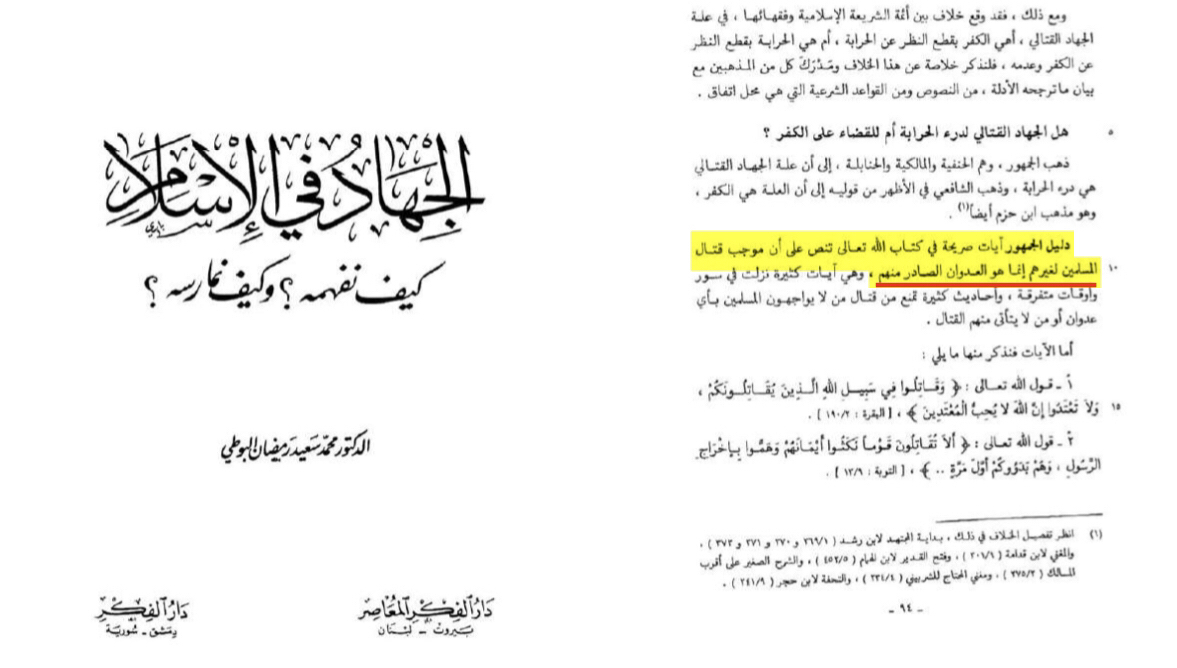 Al-thawri used to say fighting the pagans or non believers in Islam isn’t an obligation unless the start is from them and then he quoted the Qūr’ānīc verses
-Source: Sharh kitab al-siyar volume 1 page number 187 narration number 210
Al-thawri used to say fighting the pagans or non believers in Islam isn’t an obligation unless the start is from them and then he quoted the Qūr’ānīc verses
-Source: Sharh kitab al-siyar volume 1 page number 187 narration number 210
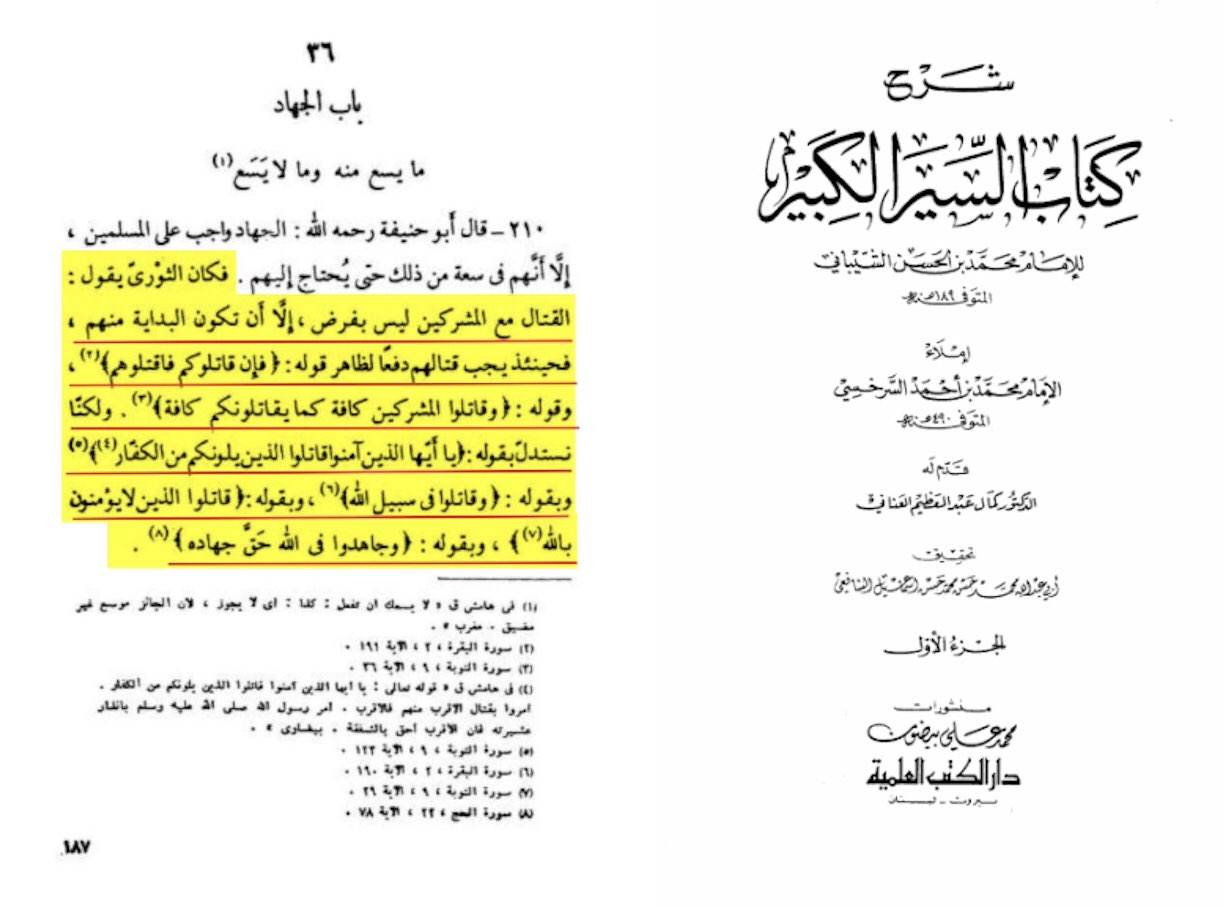 Ibn taymiyah also authenticates this saying in his book
Ibn taymiyah also authenticates this saying in his book
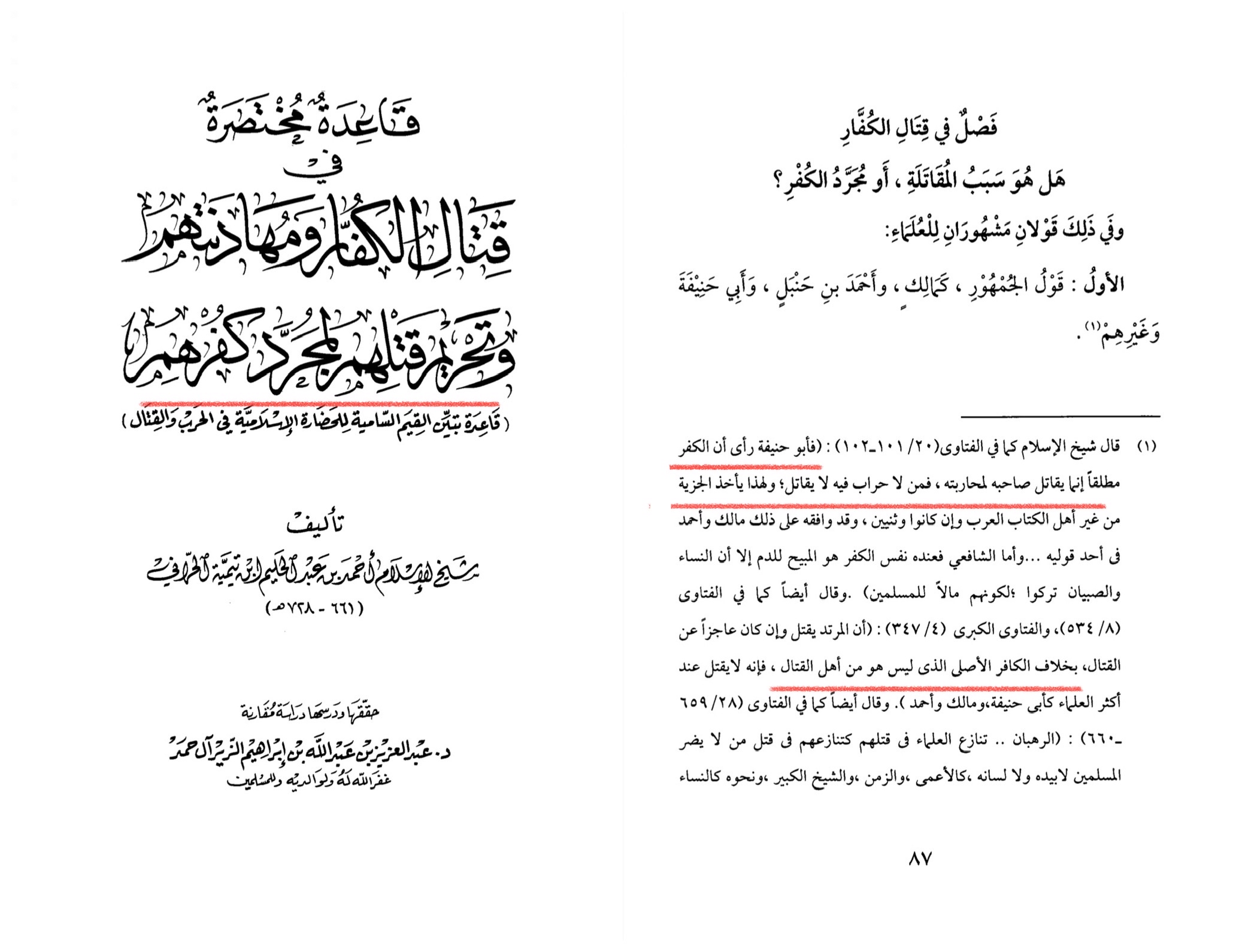 rashid redah said in his tafsir all the prophets wars were defensive
-Source: Tafsir al-Manar volume 10 page number 332 interpretation of 9:29
rashid redah said in his tafsir all the prophets wars were defensive
-Source: Tafsir al-Manar volume 10 page number 332 interpretation of 9:29
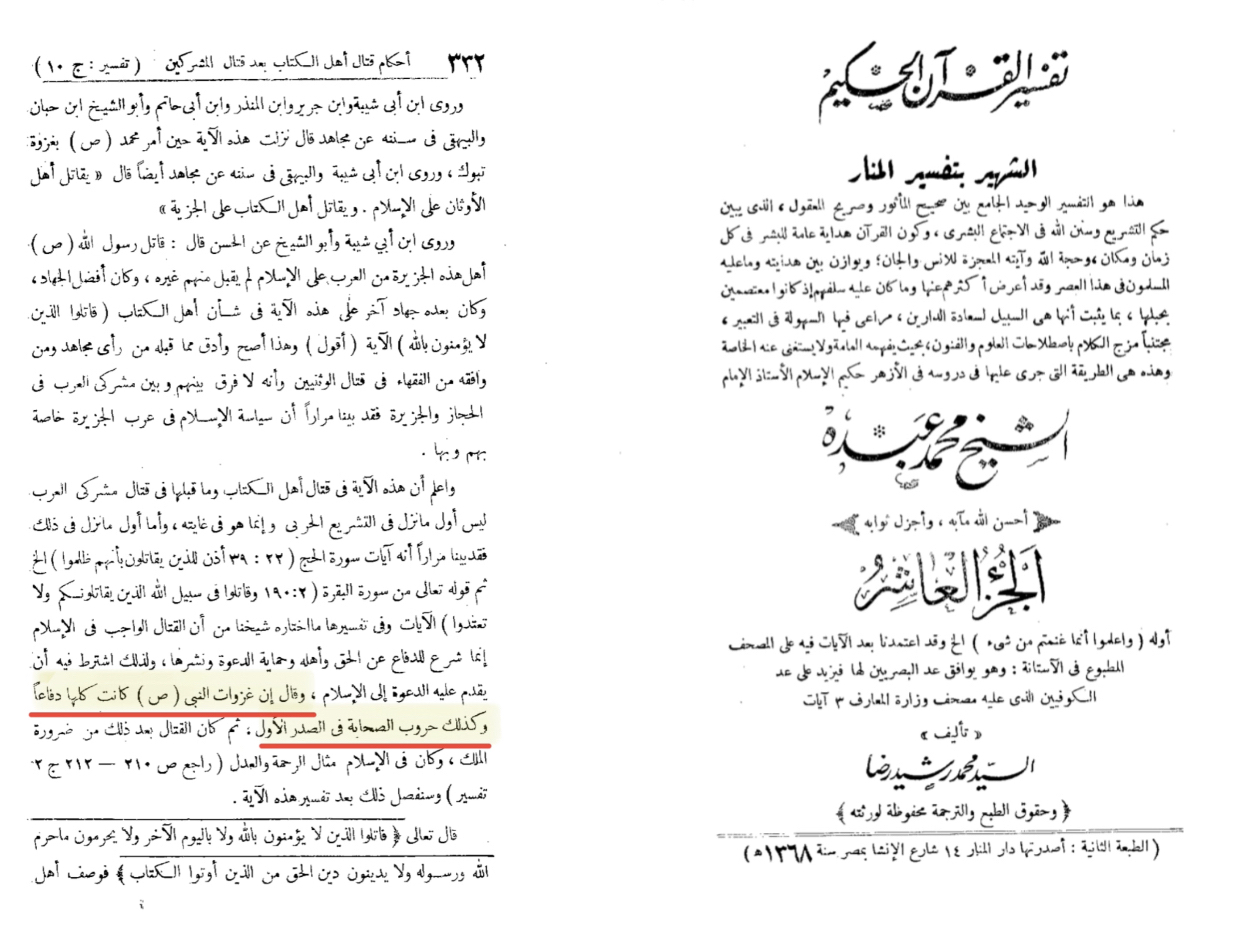 the jumhoor of the scholars of malikis hanbalis and hanafis that fighting is for waging war and fighting against us and not kufr a person isn’t just killed for having contrary views to islam
-Source: Athar al-harb fi al-fiqh al-islami page number (106)
the jumhoor of the scholars of malikis hanbalis and hanafis that fighting is for waging war and fighting against us and not kufr a person isn’t just killed for having contrary views to islam
-Source: Athar al-harb fi al-fiqh al-islami page number (106)
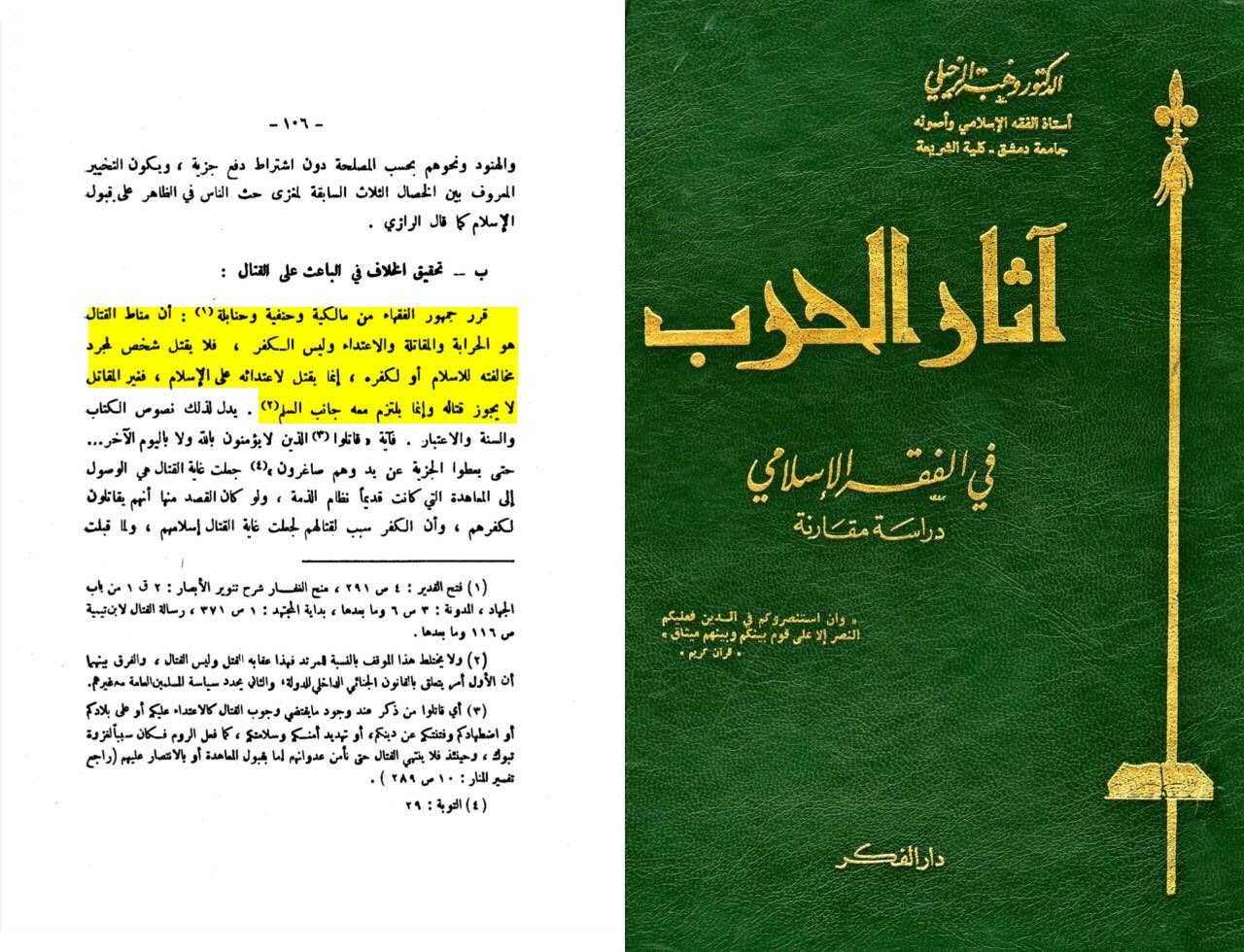 A hadith they use to try justify the acts is Sahih muslim 1731 a where it says “fight those who disbelieve”
However this could be easily refuted by look at al-mufhim and Al-mabsoot who clearly say it is the fighters only
A hadith they use to try justify the acts is Sahih muslim 1731 a where it says “fight those who disbelieve”
However this could be easily refuted by look at al-mufhim and Al-mabsoot who clearly say it is the fighters only
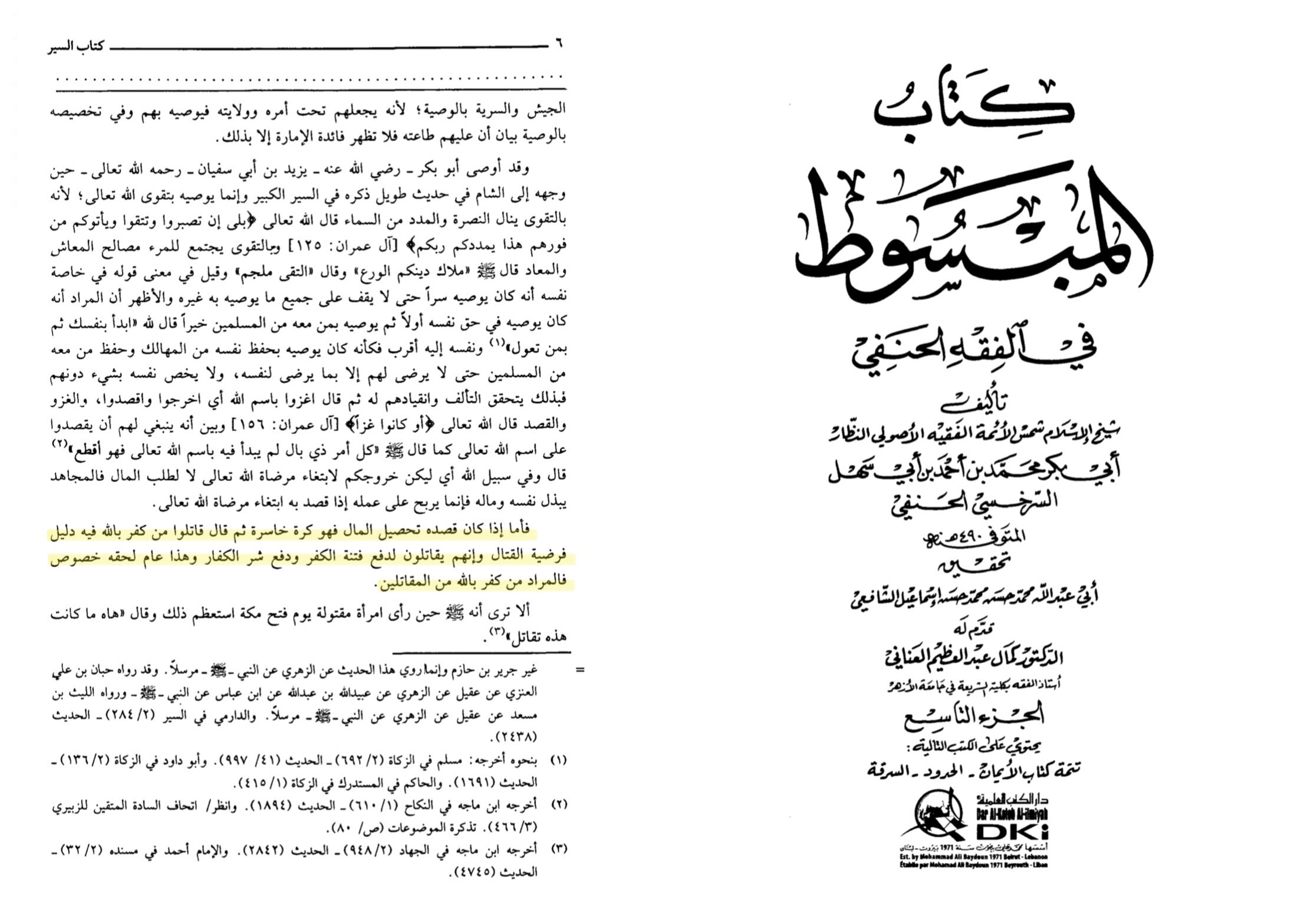
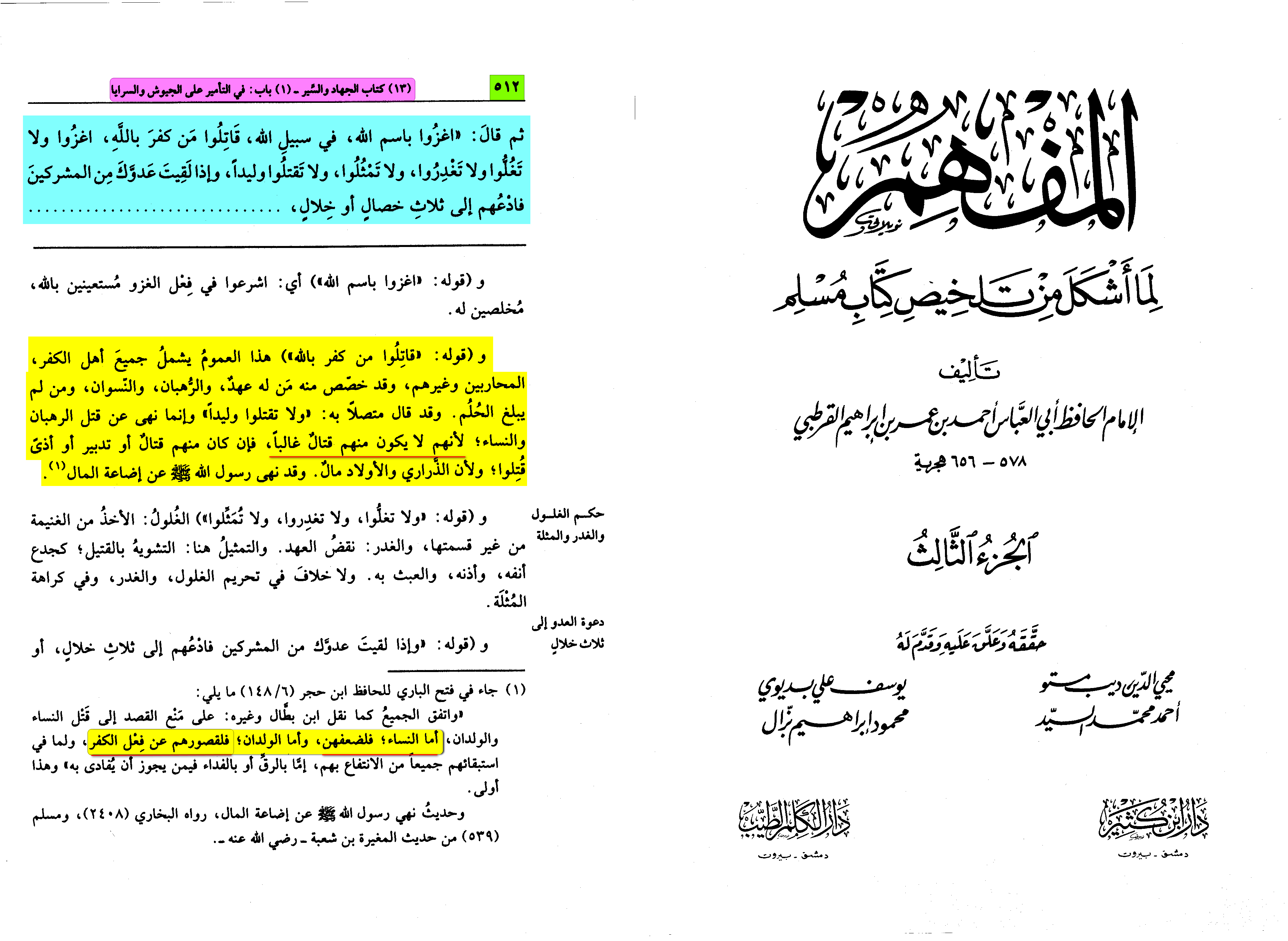 Translation: “His saying “Kufr is always mubih for blood (making blood permissible to shed) is prohibited but it is kufr along aside hirab (violence or fighting against the Muslims) and his kufr isn’t residing to fighting so doesn’t make it halal to shed”
-Bada’i al-Sana’i Fi tartib al-Shara’i (10/260)
Translation: “His saying “Kufr is always mubih for blood (making blood permissible to shed) is prohibited but it is kufr along aside hirab (violence or fighting against the Muslims) and his kufr isn’t residing to fighting so doesn’t make it halal to shed”
-Bada’i al-Sana’i Fi tartib al-Shara’i (10/260)
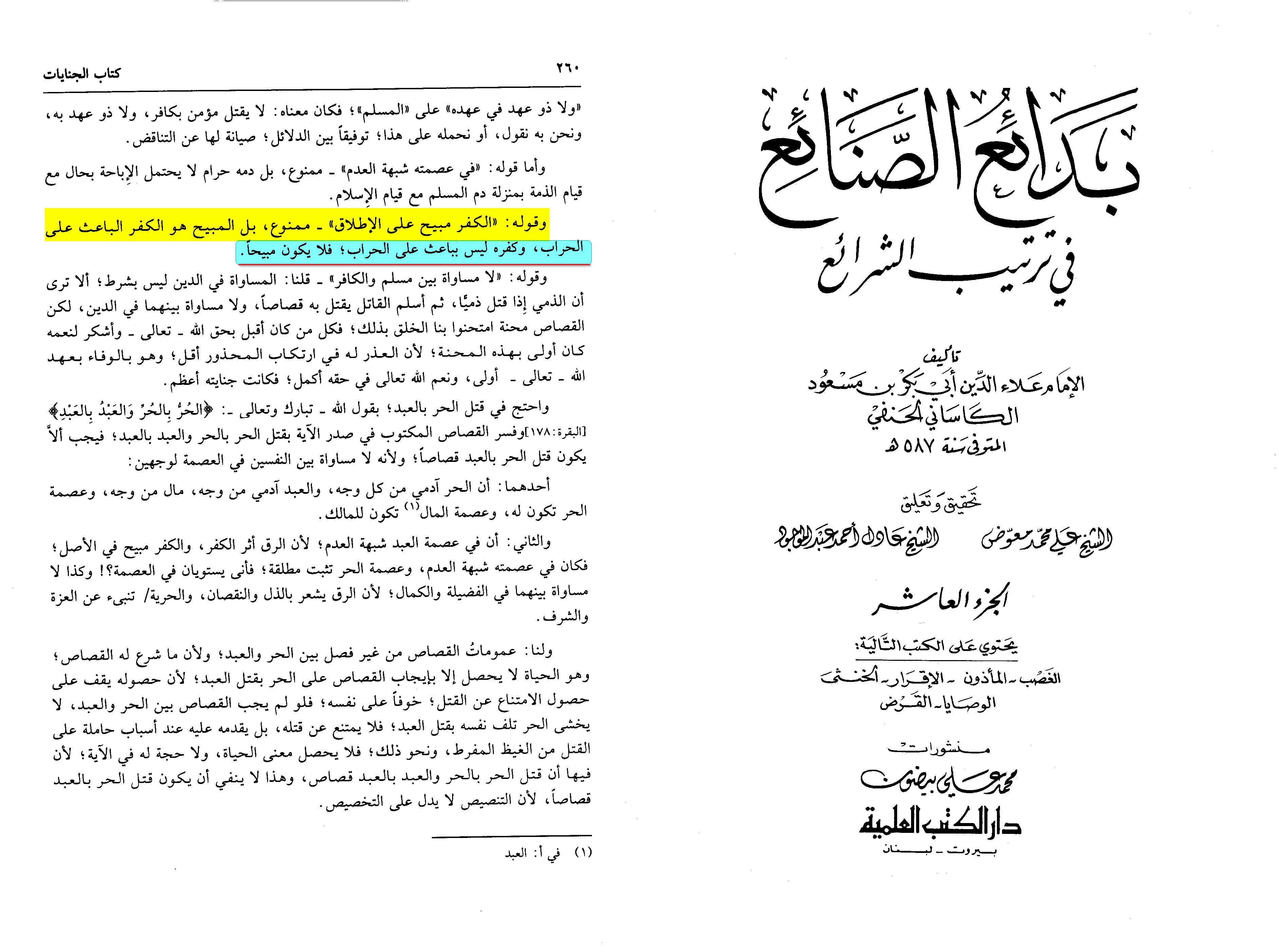 One objection people can bring out is shafi’is saying that pagan woman are to be killed after captives. But that is contradictory to the sunnah as the prophet caught many captives and here is imam ibn al-Qayyim refuting this. Ahkam ahl al-dhima 1/106
One objection people can bring out is shafi’is saying that pagan woman are to be killed after captives. But that is contradictory to the sunnah as the prophet caught many captives and here is imam ibn al-Qayyim refuting this. Ahkam ahl al-dhima 1/106
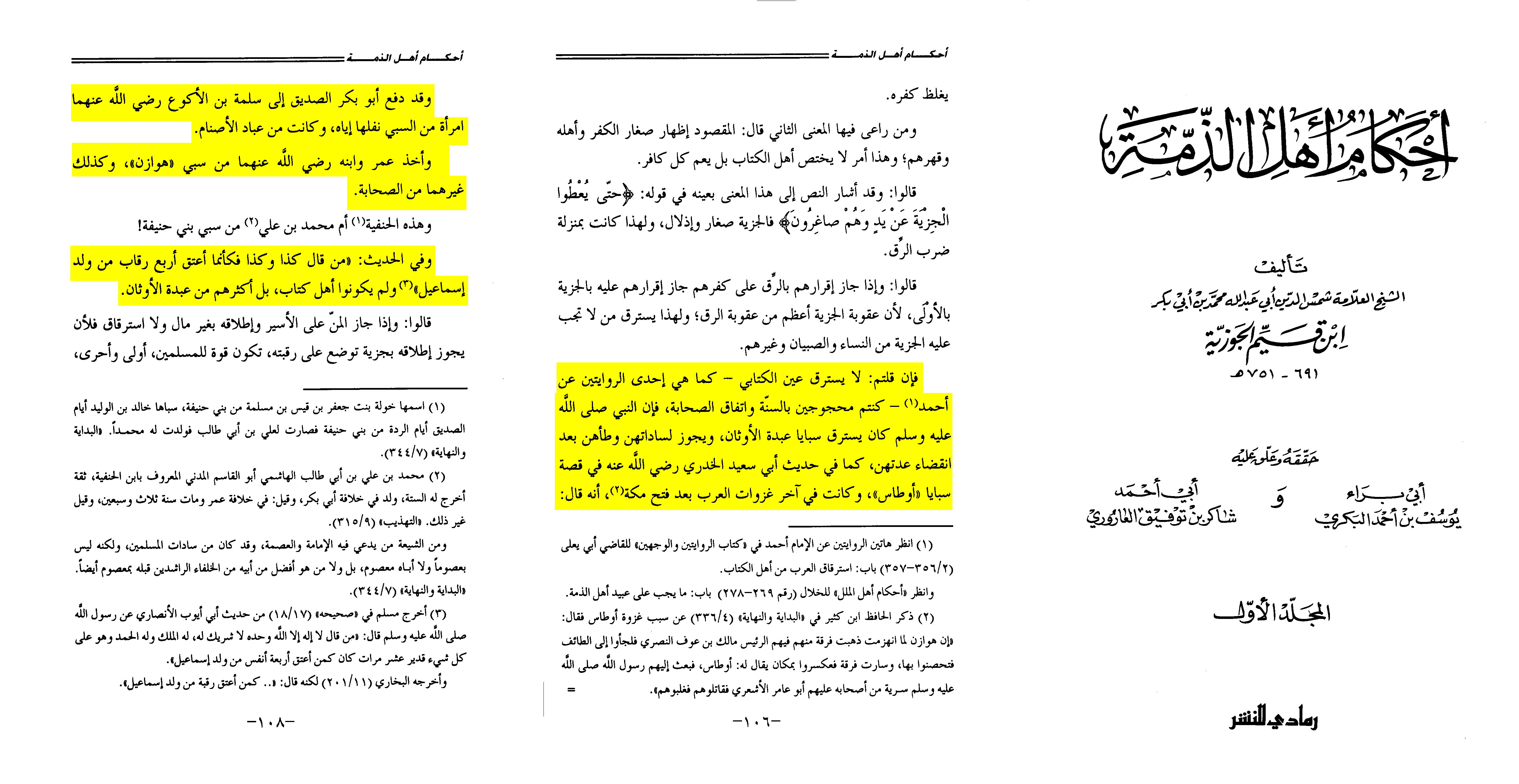 Ibn Taymiyah notes:
“As for Abu hanifa he sees kufr (original kaffir) doesn’t permit shedding someones blood except through hiraba (wagement of war) Imam Ahmed and Malik agreed with him”
Majmu’ Al-Fatawah vol.20, pages #101-102
Ibn Taymiyah notes:
“As for Abu hanifa he sees kufr (original kaffir) doesn’t permit shedding someones blood except through hiraba (wagement of war) Imam Ahmed and Malik agreed with him”
Majmu’ Al-Fatawah vol.20, pages #101-102
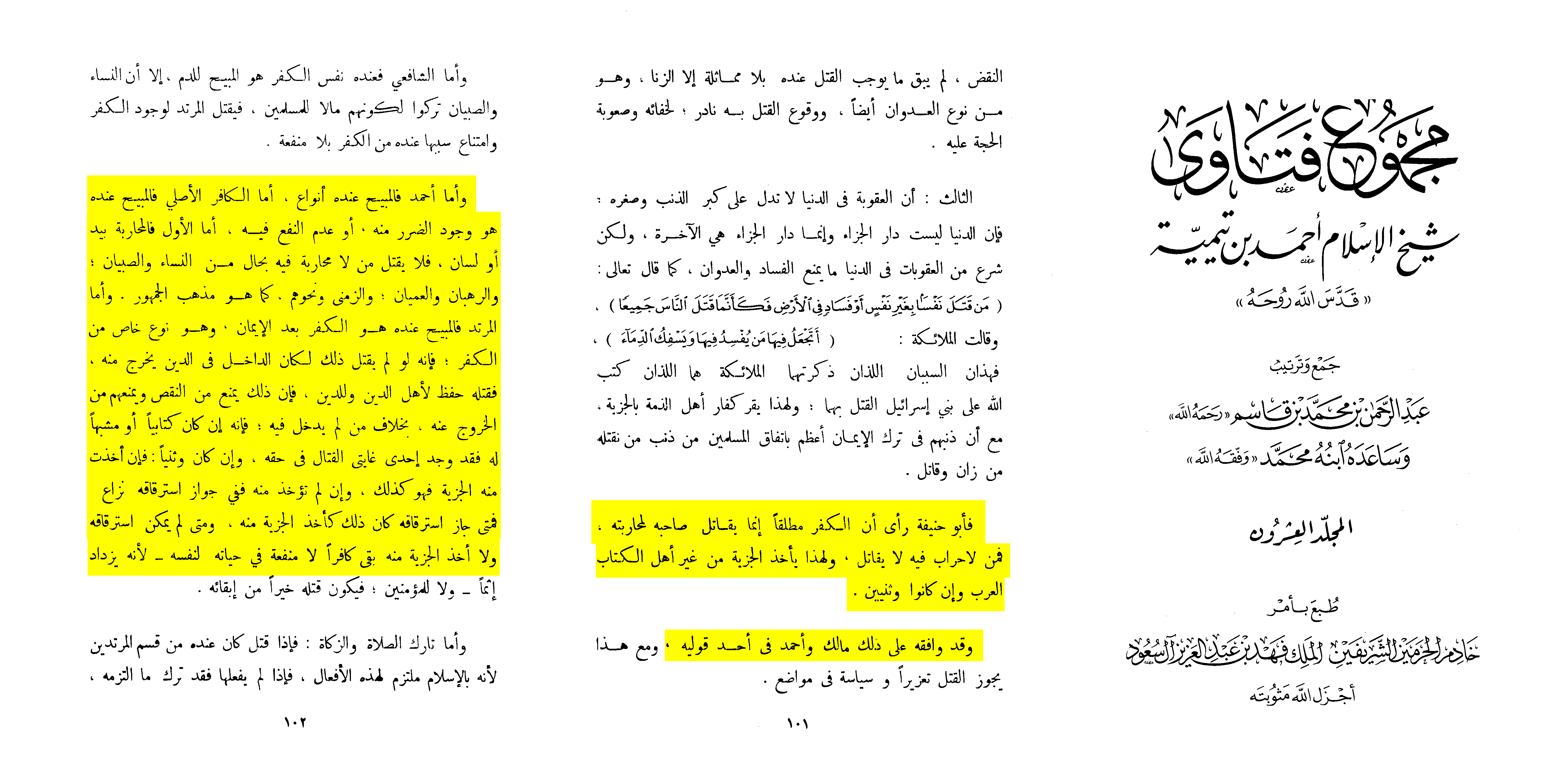 Abu Hanifa's saying - may allah have mercy on him - that what is meant by adding the abode to Islam and kufr is not the essence of Islam and kufr, but what is meant is security and fear.
What it means is that safety, if it is for the Muslims in it at all, and fear for the kuffar in general, then it is the abode of Islam. As long as the Muslims did not need to be trusted, security remained absolutely established in it, so it did not become the abode of kufr, and similarly, the security that was absolutely established did not disappear except by being adjacent to the abode of war, so its becoming the abode of war depended on their existence, although adding the abode to Islam is likely to be what you said. And it is possible that it is what we said, and it is the proof of security in it absolutely for the Muslims, but it is proven for the kuffar by contradicting the covenant and trust.
And if the addition to what we said does not become the abode of kufr except with what we said, then what is in the abode of Islam with certainty does not become the abode of kufr with doubt and possibility on the well-known principle that what is established with certainty doesnt disappear with doubt and possibility, unlike the abode of Kufr where it becomes the abode of Islam; for the emergence of the provisions of Islam in it; Because there is weighting to the side of Islam ; For his saying, peace and blessings of allah be upon him, {Islam transcends and does not transcend} so the doubt is removed that if the addition is based on the emergence of rulings, but the rulings of Kufr do not appear except when these two conditions are present
Bada'i Al-Sana'i (9/519)
EVEN if the ruler was a kaffir and all of what we mentione di spresent it becomes impermissble to attack this land
Abu Hanifa's saying - may allah have mercy on him - that what is meant by adding the abode to Islam and kufr is not the essence of Islam and kufr, but what is meant is security and fear.
What it means is that safety, if it is for the Muslims in it at all, and fear for the kuffar in general, then it is the abode of Islam. As long as the Muslims did not need to be trusted, security remained absolutely established in it, so it did not become the abode of kufr, and similarly, the security that was absolutely established did not disappear except by being adjacent to the abode of war, so its becoming the abode of war depended on their existence, although adding the abode to Islam is likely to be what you said. And it is possible that it is what we said, and it is the proof of security in it absolutely for the Muslims, but it is proven for the kuffar by contradicting the covenant and trust.
And if the addition to what we said does not become the abode of kufr except with what we said, then what is in the abode of Islam with certainty does not become the abode of kufr with doubt and possibility on the well-known principle that what is established with certainty doesnt disappear with doubt and possibility, unlike the abode of Kufr where it becomes the abode of Islam; for the emergence of the provisions of Islam in it; Because there is weighting to the side of Islam ; For his saying, peace and blessings of allah be upon him, {Islam transcends and does not transcend} so the doubt is removed that if the addition is based on the emergence of rulings, but the rulings of Kufr do not appear except when these two conditions are present
Bada'i Al-Sana'i (9/519)
EVEN if the ruler was a kaffir and all of what we mentione di spresent it becomes impermissble to attack this land
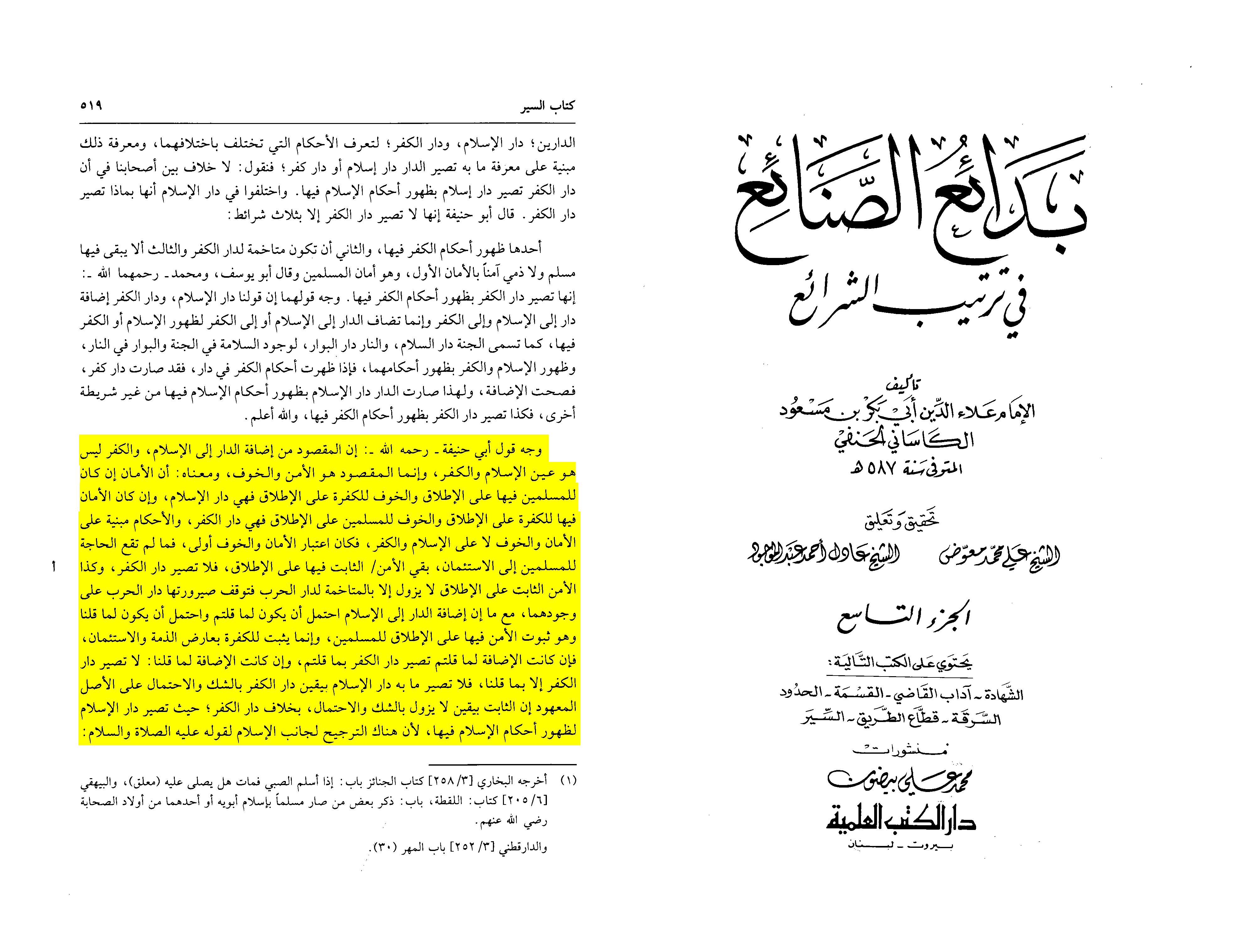 And Ibn Al-Qayyim writes:
من مقصود الجهاد أن يدفع عن نفسه وعن المسلمين
It is the purpose of jihad that one defends himself and the Muslims.
Source: ‘Uddat al-Ṣābirīn 1/32
For this reason, the majority of scholars maintain that unbelievers are only fought if they initiate hostilities first.
Ibn Taymiyyah writes:
فأما الباغي من غير قتال فليس في النص أن الله أمر بقتاله بل الكفار إنما يقاتلون بشرط الحراب كما ذهب اليه جمهور العلماء وكما دل عليه الكتاب والسنة
As for the transgressor who does not fight, then there are no texts in which Allah commands him to be fought. Rather, the unbelievers are only fought on the condition that they wage war, as is practiced by the majority of scholars and as is evident in the Book and Sunnah.
Source: al-Nubūwāt 1/140
Ibn al-Qayyim, may Allah have mercy on him, said, “The Prophet never forced the religion upon anyone, but rather he only fought those who waged war against him and fought him first. As for those who made peace with him or conducted a truce, then he never fought them and he never compelled them to enter his religion, as his Lord the Almighty had commanded him: There is no compulsion in religion, for right guidance is distinct from error (2:256). The negation in the verse carries the meaning of prohibition, namely, you may not force your religion upon anyone.”
Source: Hidāyat al-Ḥayārá 1/237
And Ibn al-Qayyim said, “Fighting is only necessary to confront war and not to confront unbelief. For this reason, women and children are not killed, neither are the elderly, the blind, or monks who do not participate in fighting. Rather, we only fight those who wage war against us. This was the way of the Messenger of Allah, peace and blessings be upon him, with the people of the earth. He would fight those who declared war on him until they accepted his religion, or they proposed a peace treaty, or they came under his control by paying tribute.”
Source: Aḥkām Ahl al-Dhimmah 1/110
Critics may try to resolve around this to prove that the kaffirs blood is only protected by a treatment that means kufr (disbelief) is the reason why someones blood to be shed. However if that was so why would there be a treatment
And Ibn Al-Qayyim writes:
من مقصود الجهاد أن يدفع عن نفسه وعن المسلمين
It is the purpose of jihad that one defends himself and the Muslims.
Source: ‘Uddat al-Ṣābirīn 1/32
For this reason, the majority of scholars maintain that unbelievers are only fought if they initiate hostilities first.
Ibn Taymiyyah writes:
فأما الباغي من غير قتال فليس في النص أن الله أمر بقتاله بل الكفار إنما يقاتلون بشرط الحراب كما ذهب اليه جمهور العلماء وكما دل عليه الكتاب والسنة
As for the transgressor who does not fight, then there are no texts in which Allah commands him to be fought. Rather, the unbelievers are only fought on the condition that they wage war, as is practiced by the majority of scholars and as is evident in the Book and Sunnah.
Source: al-Nubūwāt 1/140
Ibn al-Qayyim, may Allah have mercy on him, said, “The Prophet never forced the religion upon anyone, but rather he only fought those who waged war against him and fought him first. As for those who made peace with him or conducted a truce, then he never fought them and he never compelled them to enter his religion, as his Lord the Almighty had commanded him: There is no compulsion in religion, for right guidance is distinct from error (2:256). The negation in the verse carries the meaning of prohibition, namely, you may not force your religion upon anyone.”
Source: Hidāyat al-Ḥayārá 1/237
And Ibn al-Qayyim said, “Fighting is only necessary to confront war and not to confront unbelief. For this reason, women and children are not killed, neither are the elderly, the blind, or monks who do not participate in fighting. Rather, we only fight those who wage war against us. This was the way of the Messenger of Allah, peace and blessings be upon him, with the people of the earth. He would fight those who declared war on him until they accepted his religion, or they proposed a peace treaty, or they came under his control by paying tribute.”
Source: Aḥkām Ahl al-Dhimmah 1/110
Critics may try to resolve around this to prove that the kaffirs blood is only protected by a treatment that means kufr (disbelief) is the reason why someones blood to be shed. However if that was so why would there be a treatment
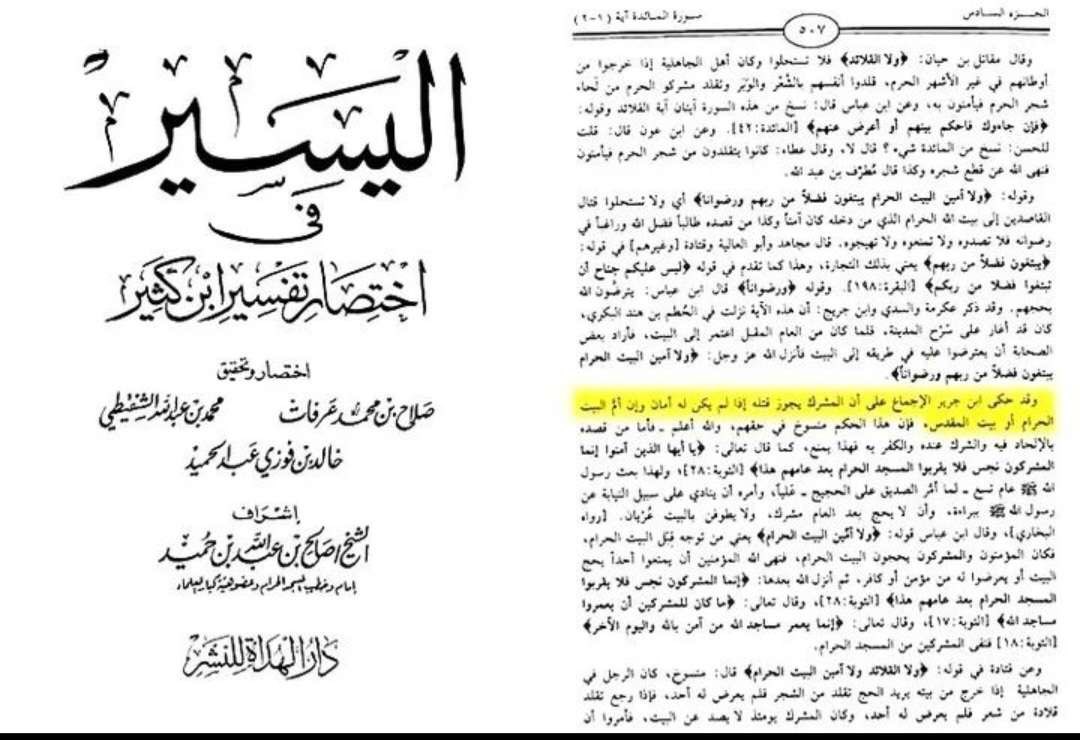 Also you can look at it this way but woman monks old people children all of those who can’t fight aren’t killed in all conditions even a dude who is minding his place from ahlul qital (people of capability to wage war)
Al-Jasas (a mu'tamad of the hanafi madhab) writes:
"Jizya is only taken from who is from the people of fighting from the impossibility of the speech being to those are not people of fighting. That is why Al-Qital (fighting) is only between two each one of them is a fighter to the other if that was proven jizya is only taken from the people of fighting and those who are not people of it no jizya is upon them"
Ahkam Al-Qur'an Al-Jasas vol#4, pg#289
Also you can look at it this way but woman monks old people children all of those who can’t fight aren’t killed in all conditions even a dude who is minding his place from ahlul qital (people of capability to wage war)
Al-Jasas (a mu'tamad of the hanafi madhab) writes:
"Jizya is only taken from who is from the people of fighting from the impossibility of the speech being to those are not people of fighting. That is why Al-Qital (fighting) is only between two each one of them is a fighter to the other if that was proven jizya is only taken from the people of fighting and those who are not people of it no jizya is upon them"
Ahkam Al-Qur'an Al-Jasas vol#4, pg#289
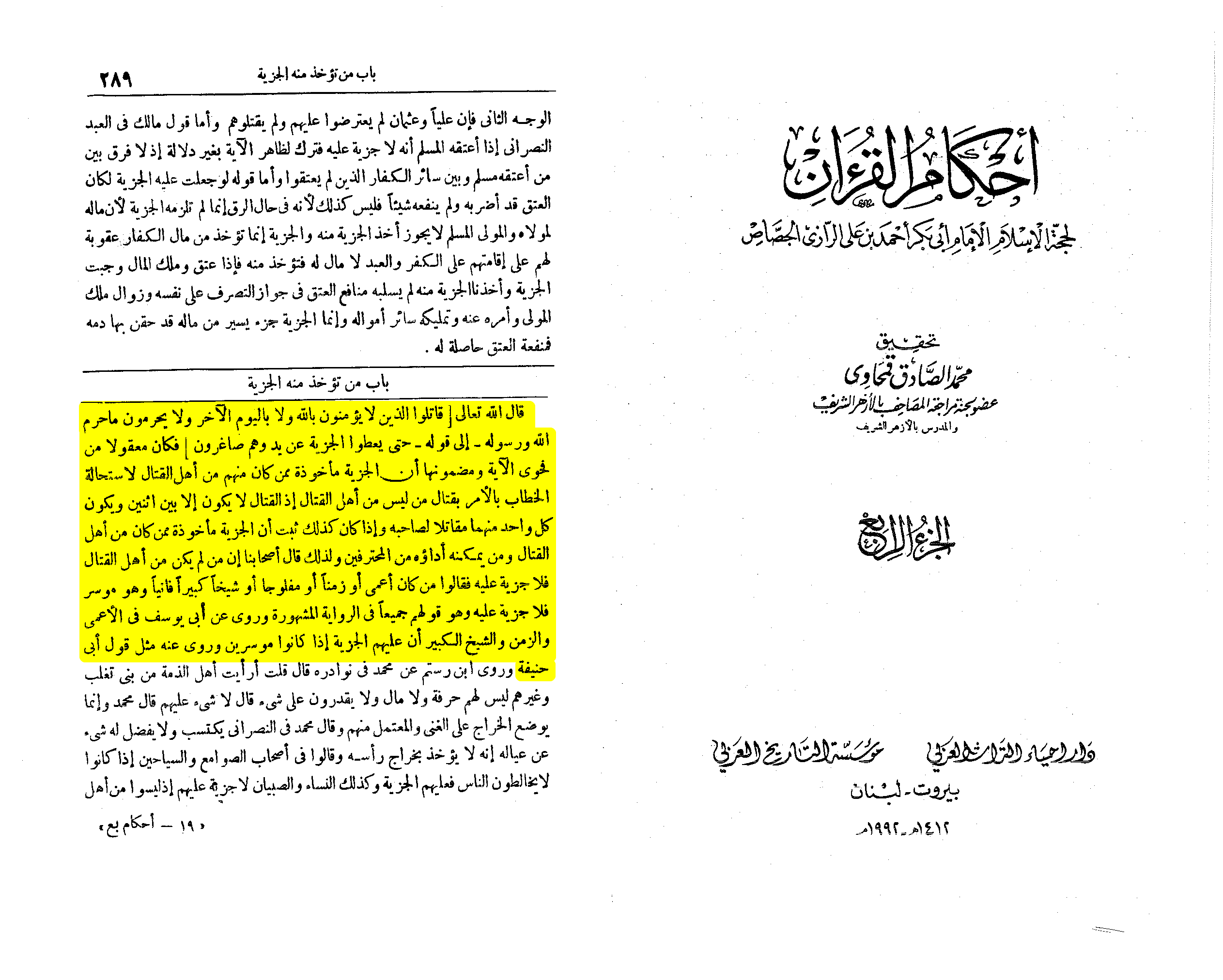 “Jihad is the way not the objective the reason we fight is to guide people (who can’t recieve the da’wah because of oppressive rulers)”
Mughni al-muhtaj volume 4, pg#277
“Jihad is the way not the objective the reason we fight is to guide people (who can’t recieve the da’wah because of oppressive rulers)”
Mughni al-muhtaj volume 4, pg#277
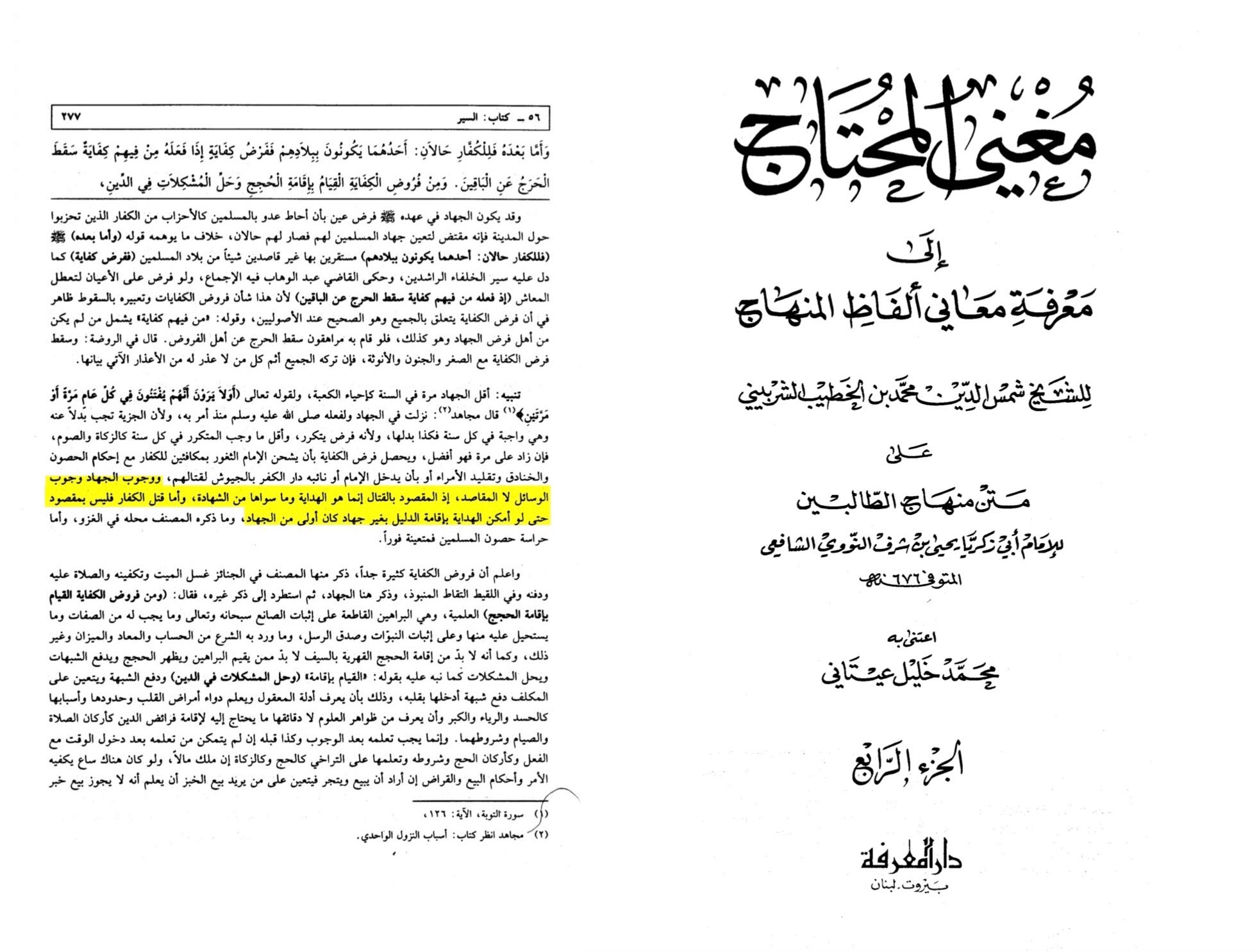 Some would use a quote in Bada’i sana’i that says whoever was a male and has hit the age of puberty it is permissible to kill him wether he fights the Muslim or not. However this isn’t the actual statement or can be misunderstood as someone who is minding his own business a person in a worshiping place a person in his house or a farmer aren’t killed even if they reached the age of puberty and were from males. Then why are the others killed let us ask ibn taymiyah
Ibn taymiyah notes:
“And it is not from the wisdom that the fighter isn’t killed while he isn’t fighting, nay whoever was from the fighters that scare the Muslims and his intention/works is to fight is killed”
Qa’idah Mukhatasarah fi Qital al-Kuffar 102-103
Some would use a quote in Bada’i sana’i that says whoever was a male and has hit the age of puberty it is permissible to kill him wether he fights the Muslim or not. However this isn’t the actual statement or can be misunderstood as someone who is minding his own business a person in a worshiping place a person in his house or a farmer aren’t killed even if they reached the age of puberty and were from males. Then why are the others killed let us ask ibn taymiyah
Ibn taymiyah notes:
“And it is not from the wisdom that the fighter isn’t killed while he isn’t fighting, nay whoever was from the fighters that scare the Muslims and his intention/works is to fight is killed”
Qa’idah Mukhatasarah fi Qital al-Kuffar 102-103
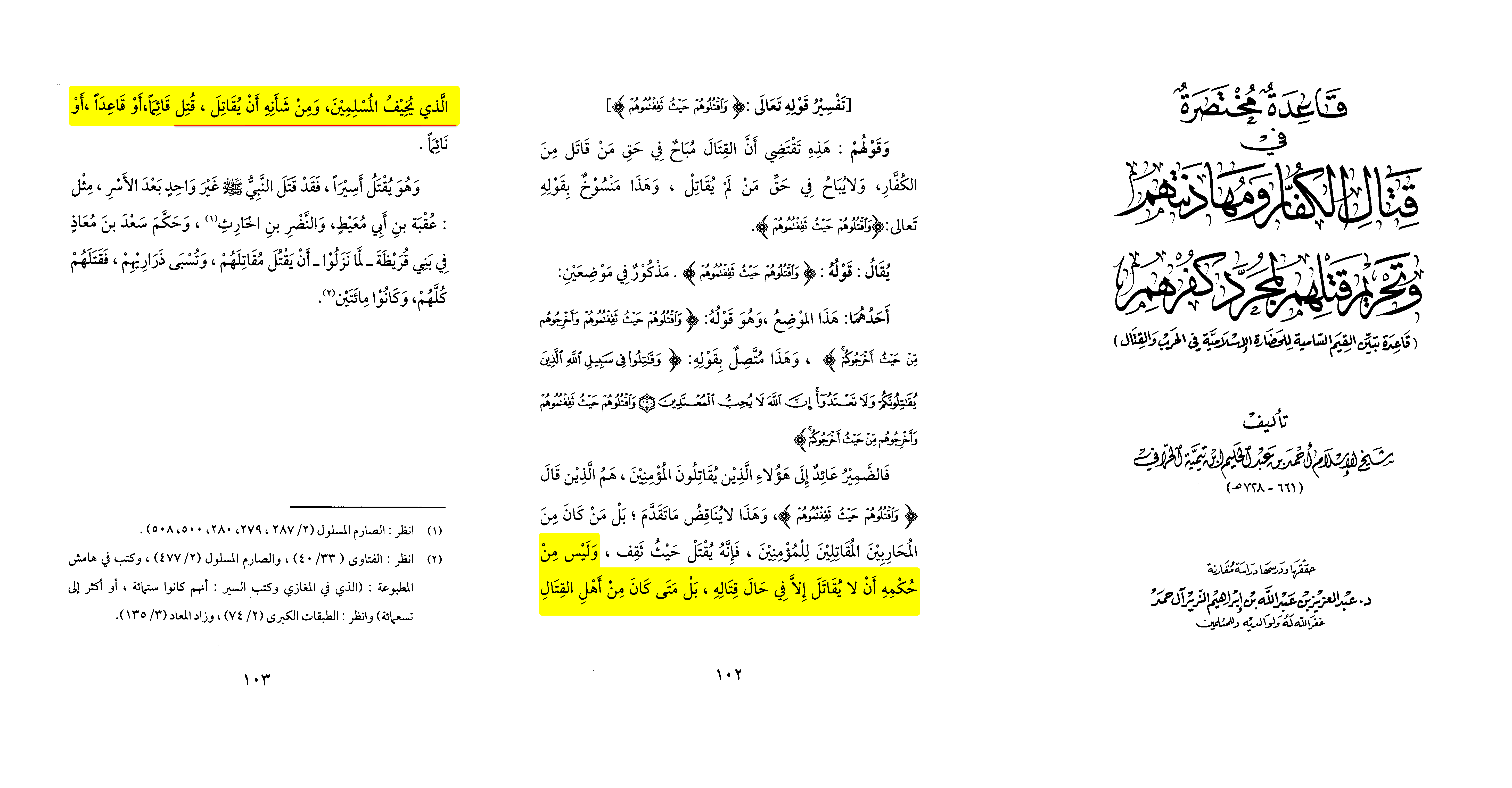 For example the leader or soldier isn’t in stage of fighting and it is war and he came to fight you would you fight him at least ? And you know he poses you danger any normal human being would answer by saying yes I would cause it is war
”Chapter heading Killing a kaffir that doesn’t harm the Muslims is mischief that neither Allah or his messenger love
Like that the Kaffir (disbeliever) that doesn’t harm the Muslims (the one without peace protection) isn’t ma’soom and he is in jahanam but killing him with no reason means that it is a mischief that neither Allah or his messenger love”
[Qa’idat Kital al-Kuffar 203]
This proves a normal kaffir with no peace contract isn’t killed
For example the leader or soldier isn’t in stage of fighting and it is war and he came to fight you would you fight him at least ? And you know he poses you danger any normal human being would answer by saying yes I would cause it is war
”Chapter heading Killing a kaffir that doesn’t harm the Muslims is mischief that neither Allah or his messenger love
Like that the Kaffir (disbeliever) that doesn’t harm the Muslims (the one without peace protection) isn’t ma’soom and he is in jahanam but killing him with no reason means that it is a mischief that neither Allah or his messenger love”
[Qa’idat Kital al-Kuffar 203]
This proves a normal kaffir with no peace contract isn’t killed
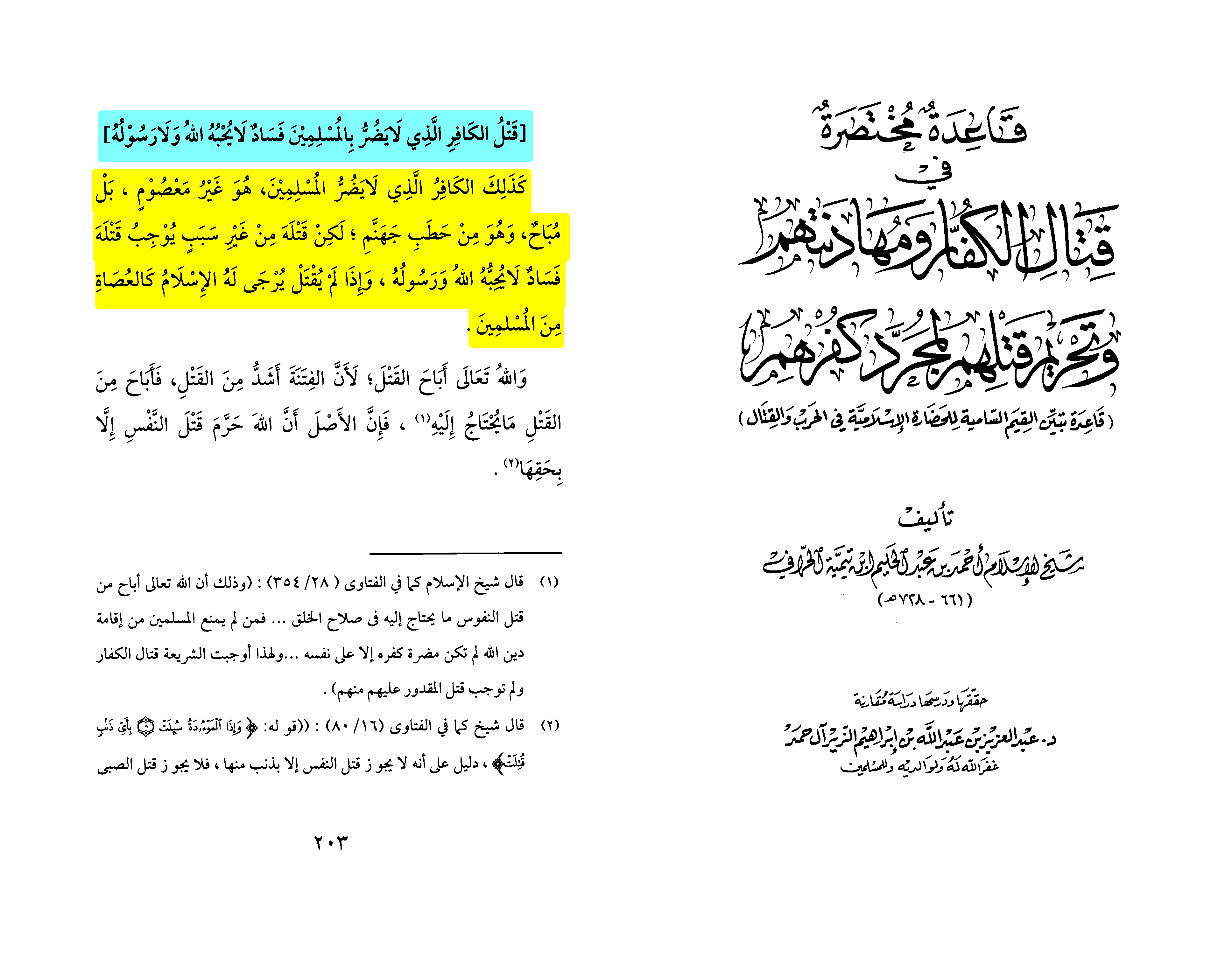 Ibn taymiyah writes:
“And his seerah was that all of who alleged treaty and didn’t fight him from the disbelievers, he (PBUH) didn’t fight him and that is in the books of sirah hadith tafsir fiqh and maghazi and it is mutawatir (mass transmitted) in his sirah. So he never started to fight any of the disbelievers so if Allāh ordered him to fight every kaffir then he would have done the negation of this.”
[Qa’idah mukhtasarah fi qital al-kuffar pg.134]
Ibn taymiyah writes:
“And his seerah was that all of who alleged treaty and didn’t fight him from the disbelievers, he (PBUH) didn’t fight him and that is in the books of sirah hadith tafsir fiqh and maghazi and it is mutawatir (mass transmitted) in his sirah. So he never started to fight any of the disbelievers so if Allāh ordered him to fight every kaffir then he would have done the negation of this.”
[Qa’idah mukhtasarah fi qital al-kuffar pg.134]
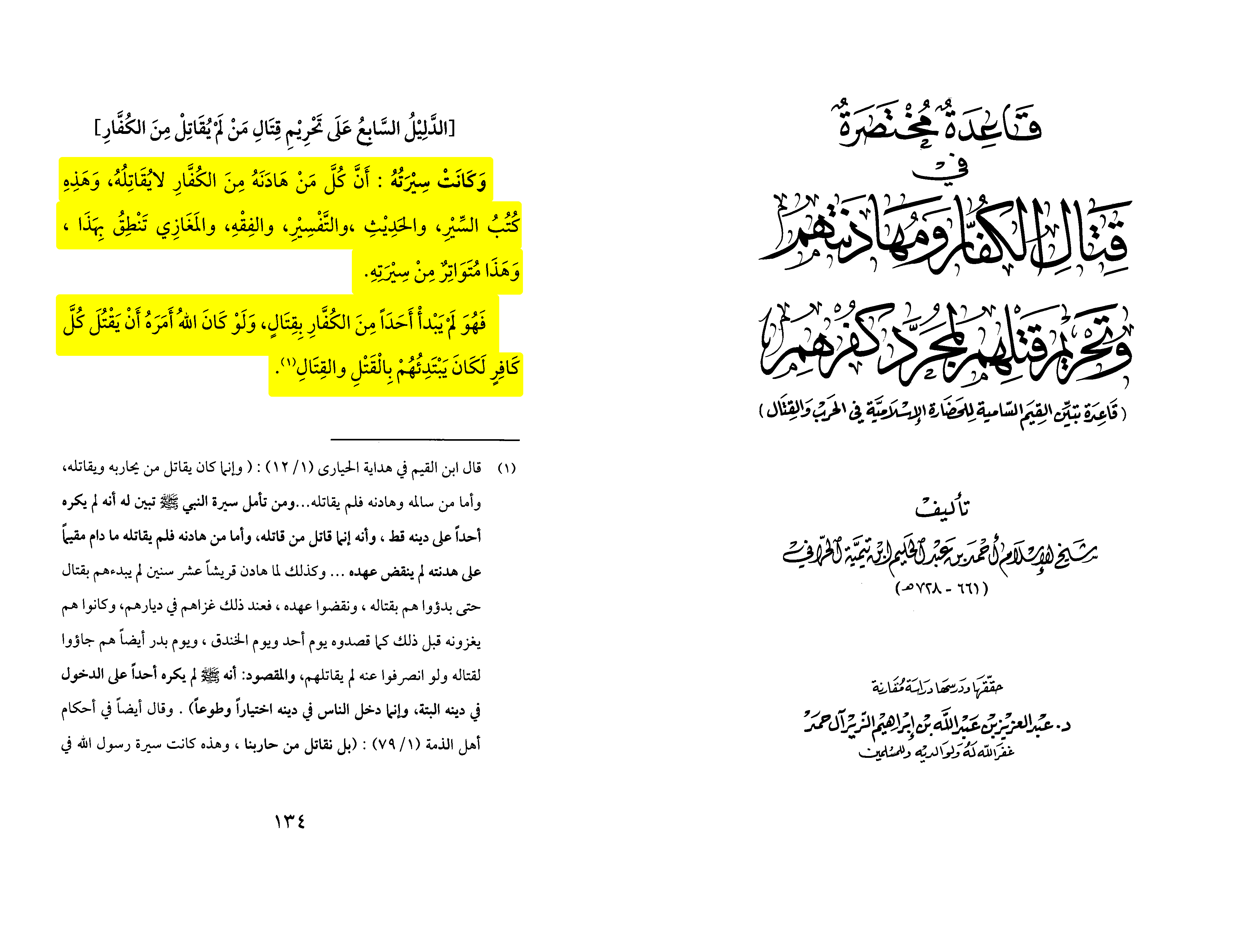 Ibn taymiyah writes:
“We say: if it is just disbelief that allows someones blood then what is the objection of killing women
They’ll reply: because she becomes a captive to the Muslims
We’ll reply: she only became a captive because of the impermissibility of shedding her blood
They’ll reply: no the reason is because she becomes money for the Muslims and a captive
We’ll reply: same is present for man as the imam can take them as captives or kill then or free them as an act of grace or by ransom”
[Qa’idah mukhtasarh fi Qital al-Kuffar pg.190]
Ibn taymiyah writes:
“We say: if it is just disbelief that allows someones blood then what is the objection of killing women
They’ll reply: because she becomes a captive to the Muslims
We’ll reply: she only became a captive because of the impermissibility of shedding her blood
They’ll reply: no the reason is because she becomes money for the Muslims and a captive
We’ll reply: same is present for man as the imam can take them as captives or kill then or free them as an act of grace or by ransom”
[Qa’idah mukhtasarh fi Qital al-Kuffar pg.190]
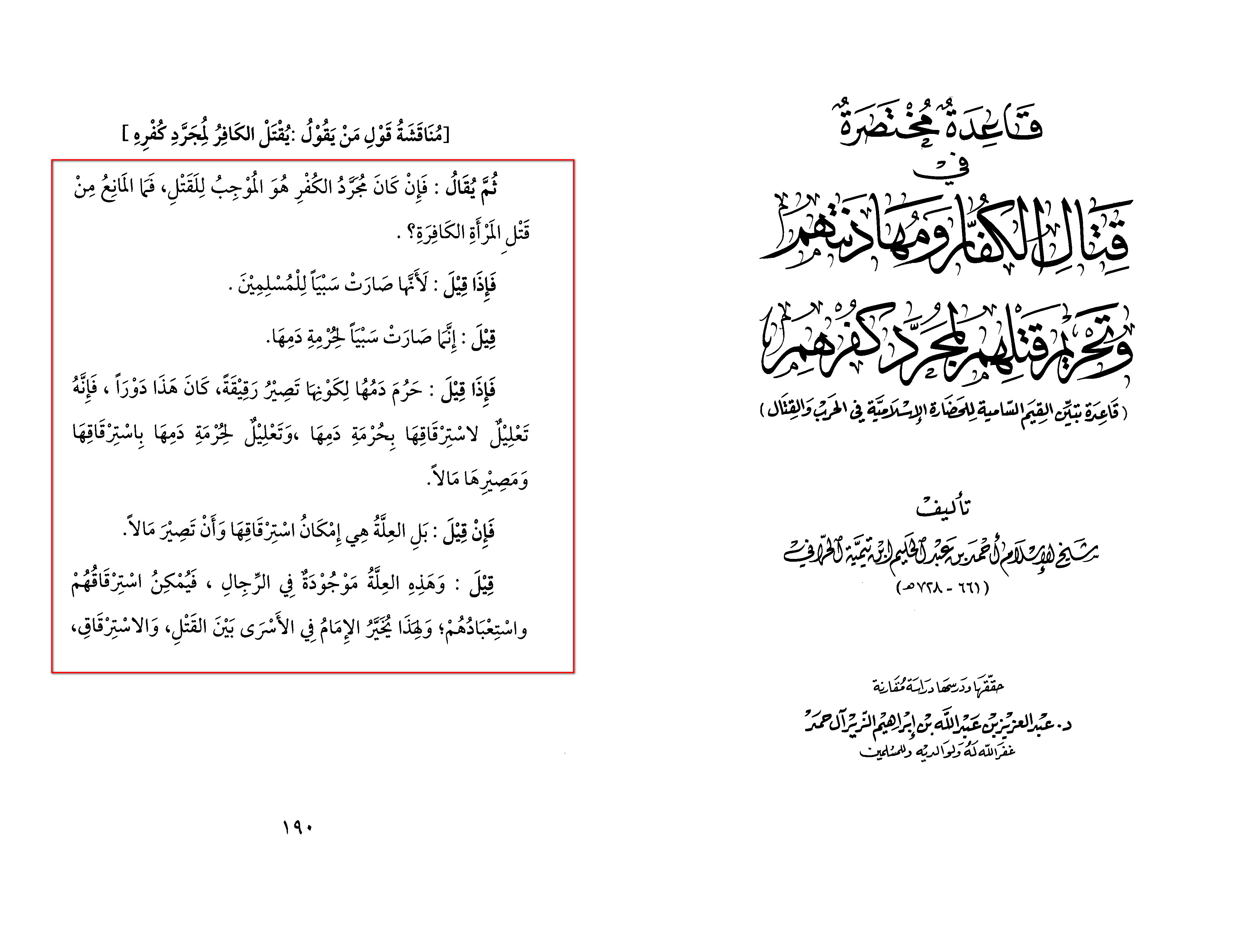
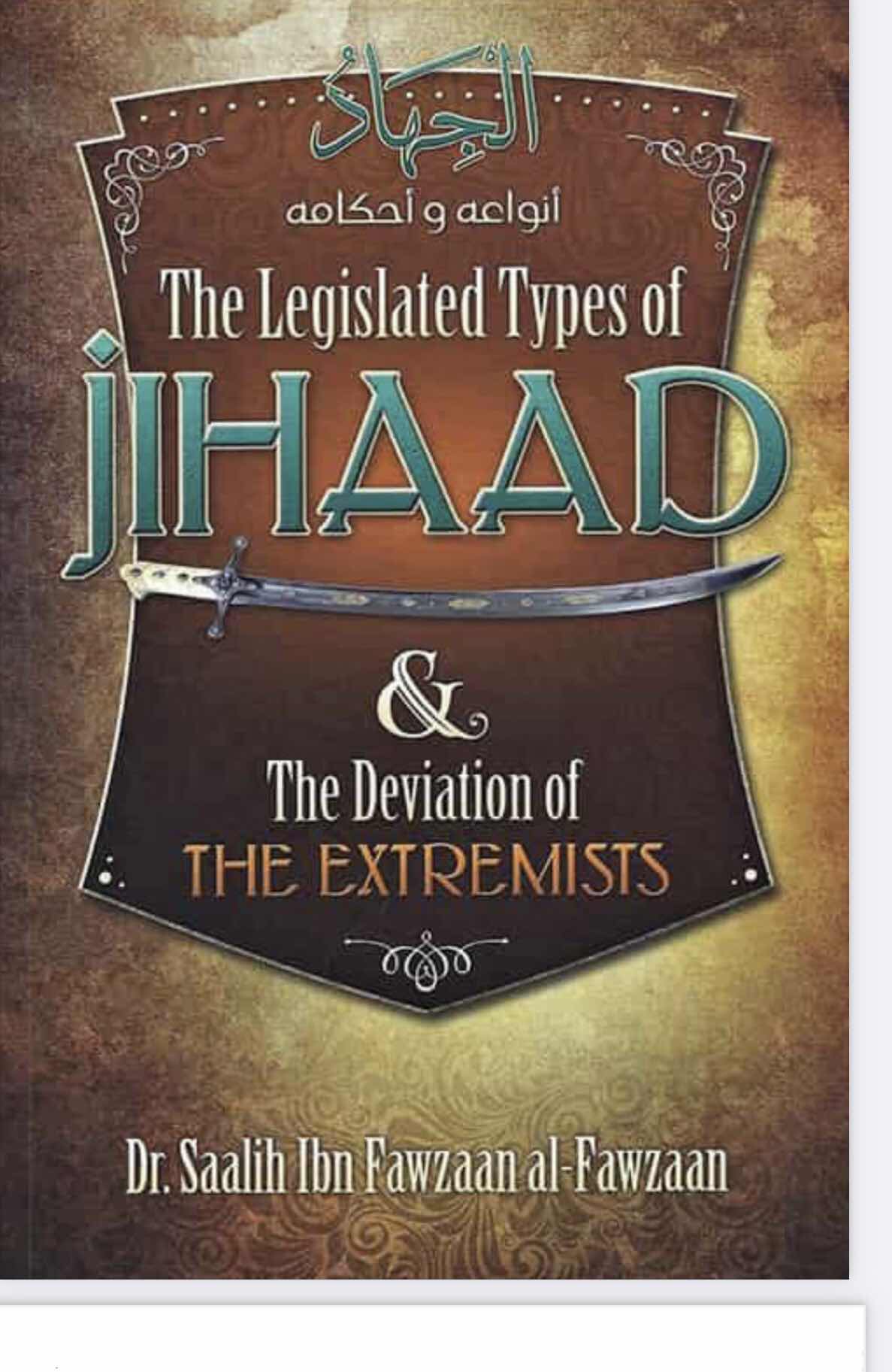
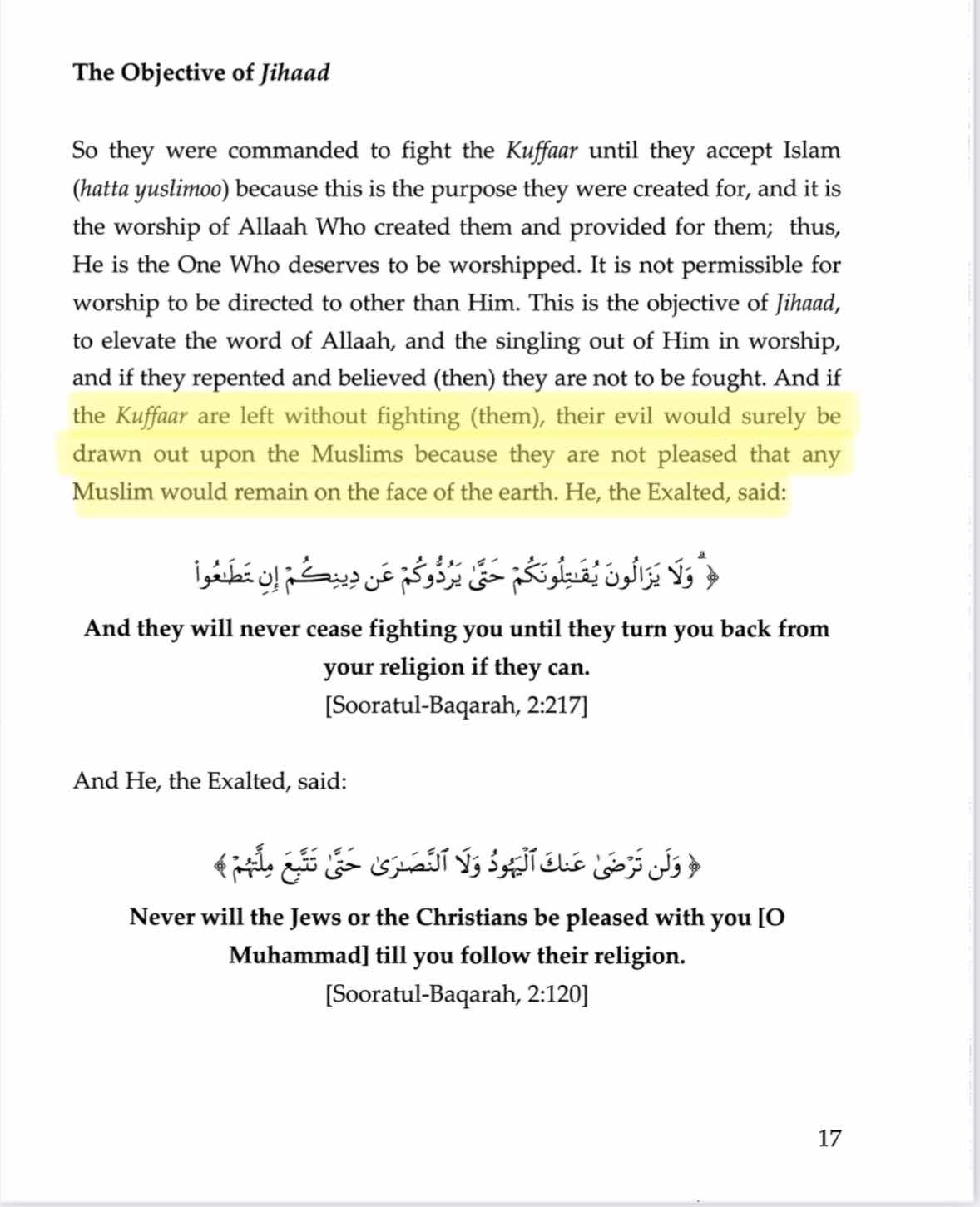 Before engaging in battle, the Prophet Muhammad (PBUH) instructed his soldiers with the following rules of war:
1. "Do not kill any child, any woman, or any elder or sick person." - (Sunan Abu Dawud)
2. "Do not practice treachery or mutilation." - (Al-Muwatta)
3. "Do not uproot or burn palms or cut down fruitful trees." - (Al-Muwatta)
4. "Do not slaughter a sheep or a cow or a camel, except for food." - (Al-Muwatta)
5. "If one fights his brother, he must avoid striking the face, for God created him in the image of Adam (AS)." - (Sahih Bukhari, Muslim)
6. "Do not kill the monks in monasteries, and do not kill those sitting places of worship." - (Musnad Ahmad Ibn Hanbal)
7. "Do not destroy the villages and towns, do not spoil the cultivated fields and gardens, and do not slaughter the cattle." - (Sahih Bukhari)
8. "Do not wish for an encounter with the enemy; pray to God to grant you security; but when you are forced to encounter them, exercise patience." - (Sahih Muslim)
9. "No one may punish with fire except the Lord of Fire." - (Sunan Abu Dawud)
10. Accustom yourselves to do good if people do good, and to not do wrong even if they commit evil." - (Al-Tirmidhi)
Imam Muhammed al-Shaybani (d. 189 A.H) :
“Disbelief is from the biggest of crimes but it is between the slave and his Lord. The punishment for this crime is delayed to the hereafter, as for what happens in this world it is legislated for the benet of the servants of God, in this case it is defence against the sedition of ghting. This (sedition) does not appear from non combatants.”
[Sharh kitab al-Syar al-Kabir (4/186)]
Before engaging in battle, the Prophet Muhammad (PBUH) instructed his soldiers with the following rules of war:
1. "Do not kill any child, any woman, or any elder or sick person." - (Sunan Abu Dawud)
2. "Do not practice treachery or mutilation." - (Al-Muwatta)
3. "Do not uproot or burn palms or cut down fruitful trees." - (Al-Muwatta)
4. "Do not slaughter a sheep or a cow or a camel, except for food." - (Al-Muwatta)
5. "If one fights his brother, he must avoid striking the face, for God created him in the image of Adam (AS)." - (Sahih Bukhari, Muslim)
6. "Do not kill the monks in monasteries, and do not kill those sitting places of worship." - (Musnad Ahmad Ibn Hanbal)
7. "Do not destroy the villages and towns, do not spoil the cultivated fields and gardens, and do not slaughter the cattle." - (Sahih Bukhari)
8. "Do not wish for an encounter with the enemy; pray to God to grant you security; but when you are forced to encounter them, exercise patience." - (Sahih Muslim)
9. "No one may punish with fire except the Lord of Fire." - (Sunan Abu Dawud)
10. Accustom yourselves to do good if people do good, and to not do wrong even if they commit evil." - (Al-Tirmidhi)
Imam Muhammed al-Shaybani (d. 189 A.H) :
“Disbelief is from the biggest of crimes but it is between the slave and his Lord. The punishment for this crime is delayed to the hereafter, as for what happens in this world it is legislated for the benet of the servants of God, in this case it is defence against the sedition of ghting. This (sedition) does not appear from non combatants.”
[Sharh kitab al-Syar al-Kabir (4/186)]
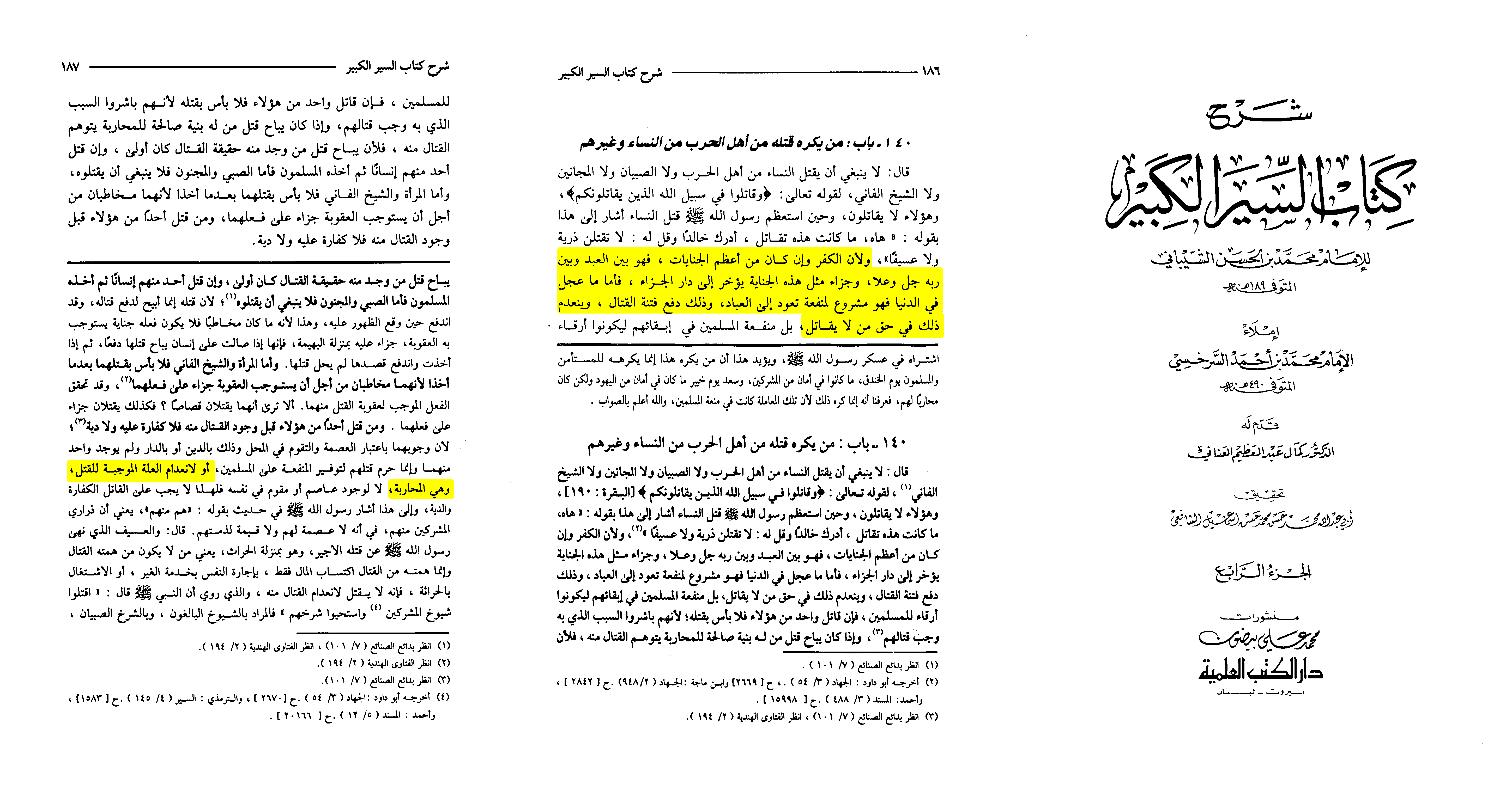
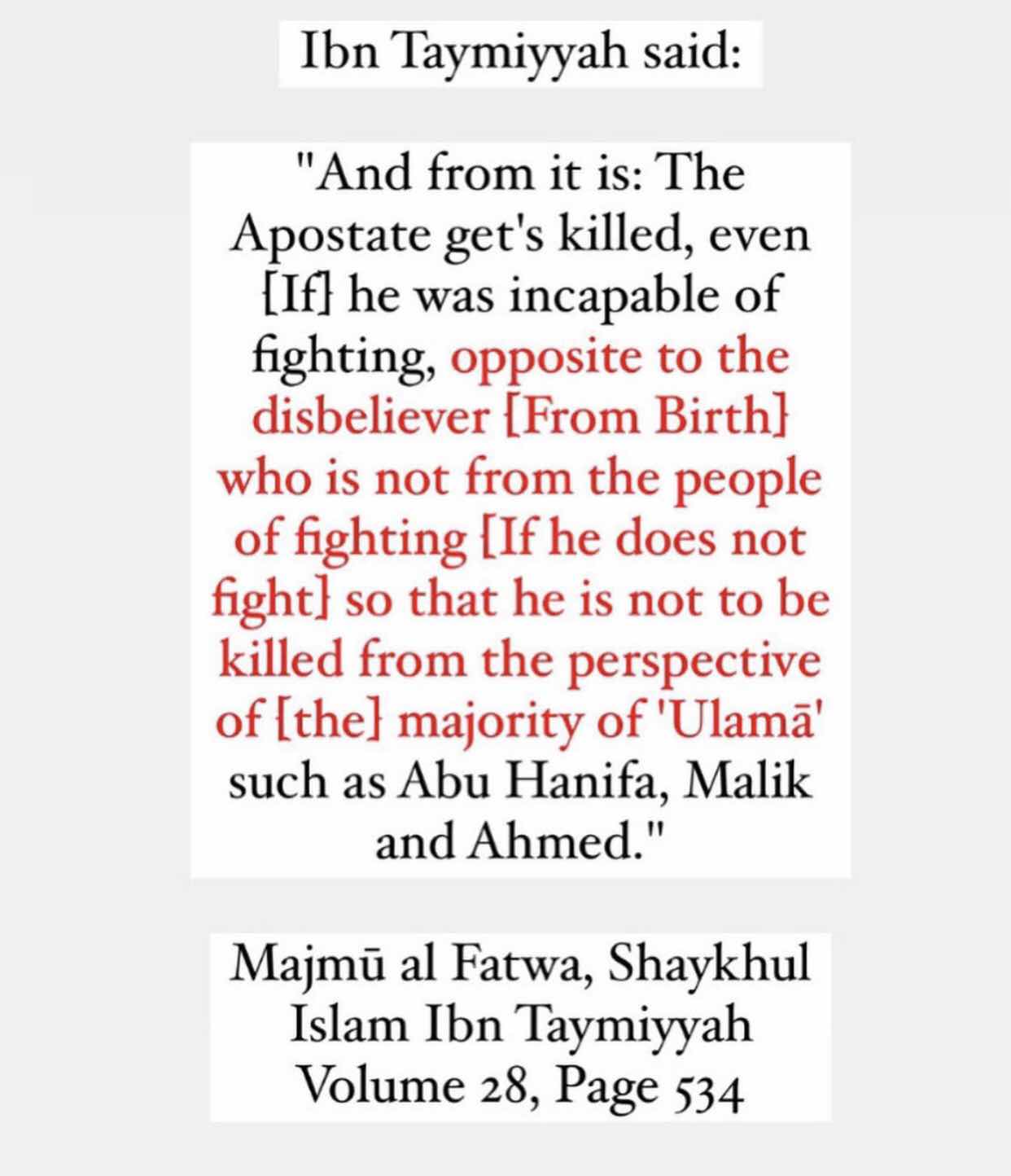
 Sufyan Ath-Thawri, may Allah have mercy on him, said:
الْقِتَالُ مَعَ الْمُشْرِكِينَ لَيْسَ بِفَرْضٍ إلَّا أَنْ تَكُونَ الْبِدَايَةُ مِنْهُمْ فَحِينَئِذٍ يَجِبُ قِتَالُهُمْ دَفْعًا
Fighting the idolaters is not an obligation unless they begin it themselves, in which case it is required to fight them in defense.
Source: Sharḥ al-Siyar al-Kabīr 1/187
Abdullah ibn Yazid Reported: The Prophet, peace and blessings be upon him, prohibited plundering and mutilation.
Source: Ṣaḥīḥ al-Bukhārī 5197
Grade: Sahih (authentic) according to Al-Bukhari
Narrated Jabir bin `Abdullah:
That he proceeded in the company of Allah's Messenger (ﷺ) towards Najd to participate in a Ghazwa. (Holybattle) When Allah's Messenger (ﷺ) returned, he too returned with him. Midday came upon them while they were in a valley having many thorny trees. Allah's Messenger (ﷺ) and the people dismounted and dispersed to rest in the shade of the trees. Allah's Messenger (ﷺ) rested under a tree and hung his sword on it. We all took a nap and suddenly we heard Allah's Messenger (ﷺ) calling us. (We woke up) to see a bedouin with him. The Prophet (ﷺ) said, "This bedouin took out my sword while I was sleeping and when I woke up, I found the unsheathed sword in his hand and he challenged me saying, 'Who will save you from me?' I said thrice, 'Allah.' The Prophet (ﷺ) did not punish him but sat down.
Source: Ṣaḥīḥ al-Bukhārī 2910 grade: Ṣaḥīḥ
In another report the prophet made a condition with him that he doesn’t fight him ever. This hadith is an example of how the reason we fight is to eliminate harm not disbelief.
Refuting the Argument that the Muslims Instigated the Battle of Badr
Credit to Bassam Zawadi
David Wood during his rebuttal in his debate with Sami Zaatari on "Is Islam a Religion of Peace?" tried to argue that the Battle of Badr was Prophet Muhammad's (peace be upon him) fault when he said:
”But once he got to Medina, he was safe. You can tell by reading sources they [i.e. the Meccans] didn't care about him anymore. He was out of their hair and he had the protection of five tribes there. So Muhammad was safe and instead of living a life of peace he chose to go out and attack them and attack them and attack them until there was a full blown war.” (Time slice: 26:08-26:27)
Just like his other missionary friends David forgets to leave out certain details and distorts what really happened.
Notice that he said that once Prophet Muhammad (peace be upon him) and the other Muslims migrated from Mecca to Medina they were safe from the Meccans. At first, one should become immediately suspicious of this especially when we take into consideration that the Meccans wouldn't have such an attitude as we clearly saw when they didn't leave the Muslims alone when they first migrated to Abyssinia
—-
David's statement "You can tell by reading sources they didn't care about him anymore" is just absolute falsehood.
Saifur Rahman al-Mubarakpuri states:
“That was the demo-political picture within Madinah. Five hundred kilometres away in Makkah, there still lay another source of detrimental threat, the archenemy of Islam, Quraish. For ten years, while at the mercy of Quraish, the Muslims were subjected to all sorts of terrorism, boycott, harassment and starvation coupled by a large scale painstaking psychological war and aggressive organized propaganda. When they had emigrated to Madinah, their land, wealth and property were seized, wives detained and the socially humble in rank brutally tortured. Quraish also schemed and made attempts on the life of the first figure of the Call, Muhammad [pbuh]. Due to their acknowledged temporal leadership and religious supremacy among the pagan Arabs, given the custodianship of the Sacred Sanctuary, the Quraishites spared no effort in enticing the Arabians against Madinah and boycotting the Madinese socially and economically. To quote Muhammad Al-Ghazali: "A state of war virtually existed between the Makkan tyrants and the Muslims in their abode. It is foolish to blame the Muslims for the horrible consequences that were bound to ensue in the light of that long-standing feud."[Fiqh As-Seerah p.162]
The Muslims in Madinah were completely eligible then to confiscate the wealth of those tyrants, mete out for them exemplary punishment and bring twofold retaliation on them in order to deter them from committing any folly against the Muslims and their sanctities. (Saifur Rahman al-Mubarakpuri, The Sealed Nectar, Chapter on Life in Medina)
——
Saifur Rahman al-Mubarakpuri goes on to present his proof from the authentic Islamic sources:
The Quraishites, mortified at the escape of the Prophet [pbuh] along with his devoted companions, and jealous of his growing power in Madinah, kept a stringent watch over the Muslims left behind and persecuted them in every possible way. They also initiated clandestine contacts with 'Abdullah bin Uabi bin Salul, chief of Madinese polytheists, and president designate of the tribes 'Aws and Khazraj before the Prophet's emigration. They sent him a strongly-worded ultimatum ordering him to fight or expel the Prophet, otherwise they would launch a widespread military campaign that would exterminate his people and proscribe his women. [Narrated by Abu Da'ud]
——
His pride wounded and kingship no longer his, 'Abdullah bin Uabi bin Salul, a priori responded positively to his Quraishite co-polytheists. He mobilized his supporters to counteract the Muslims. The Prophet [pbuh] on hearing about this unholy alliance, summoned 'Abdullah and admonished him to be more sensible and thoughtful and cautioned his men against being snared in malicious tricks. [Narrated by Abu Da'ud] The men, on grounds of cowardice, or reason, gave up the idea. Their chief, however, seemingly complied, but at heart, he remained a wicked unpredictable accomplice with Quraish and the envious Jews. Skirmishes and provocations started to pave the way for a major confrontation between the Muslims and polytheists. Sa'd bin Mu'adh, an outstanding Helper, announced his intention to observe 'Umrah (lesser pilgrimage) and headed for Makkah. There Omaiya bin Khalaf provided tutelage for him to observe the ritual circumambulation. Abu Jahl, an archenemy of Islam saw him in the Sacred Sanctuary and threatened he would have killed him if he had not been in the company of Omaiya. Sa'd, fearlessly and defiantly, challenged him to committing any folly at the risk of cutting their caravans off. [Bukhari 2/563]
—-
Provocative actions continued and Quraish sent the Muslims a note threatening to put them to death in their own homeland. Those were not mere words, for the Prophet [pbuh] received information from reliable sources attesting to real intrigues and plots being hatched by the enemies of Islam. Precautionary measures were taken and a state of alertness was called for, including the positioning of security guards around the house of the Prophet [pbuh] and strategic junctures. 'Aishah [R] reported that Allâh's Messenger [pbuh] lay down on bed during one night on his arrival in Madinah and said: Were there a pious person from amongst my Companions who should keep a watch for me during the night? She ('Aishah [R]) said: We were in this state when we heard the clanging noise of arms. He (the Prophet [pbuh]) said: Who is it? He said: This is Sa'd bin Abi Waqqas. Allâh's Messenger [pbuh] said to him: What brings you here? Thereupon he said: I harboured fear (lest any harm should come to) Allâh's Messenger [pbuh], so I came to serve as your sentinel. Allâh's Messenger [pbuh] invoked blessings upon him and then he slept. [Muslim 2/280; Bukhari 1/404]
——
This state of close vigilance continued ceaselessly until the Words of Allâh were revealed saying:
"Allâh will protect you from mankind." [Al-Qur'an 5:67]
Here, the Prophet [pbuh] peeped from the dome of his house asking his people to go away, and making it clear that Allâh would take the charge of protecting him.[At-Tirmidhi 2/130]
The Prophet's life was not the only target of the wicked schemes, but rather the lives and the whole entity of the Muslims. When the Madinese provided the Prophet [pbuh] and his Companions with safe refuge, the desert bedouins began to look at them all in the same perspective, and outlawed all the Muslims.
At this precarious juncture with Quraish, intent on pursuing their aggressive and devilish plans, Allâh, the All-High, gave the Muslims the permission to take arms against the disbelievers:
"Permission to fight is given to those (i.e. believers against those disbelievers), who are fighting them, (and) because they (believers) have been wronged, and surely Allâh is Able to give them (believers) victory." [Al-Qur'an 22:39] (Saifur Rahman al-Mubarakpuri, The Sealed Nectar, Chapter on The Prophet on the Battlefield)
——-
We learn the following facts:
The Meccans took possession of the properties of the Muslims and their wives whom they left behind after they made them escape Mecca.
The Meccans attempted to entice 'Abdullah bin Ubai bin Salul to fight against the Muslims and wipe them out.
The Meccans sent a threatening note to the Muslims stating that they would be destroyed.
Due to the above facts we shouldn't be surprised to see that the Prophet (peace be upon him) had bodyguards protecting him until the revelation from Allah was revealed ensuring his safety.
Now if Muhammad (peace be upon him) was safe from the Meccans as David claimed, why would the Prophet (peace be upon him) feel the need to have bodyguards protecting him? The answer is simple, it is because he wasn't safe and the Meccans didn't leave him alone.
We demand that David Wood retracts this argument, which is baseless and absurd.
Sufyan Ath-Thawri, may Allah have mercy on him, said:
الْقِتَالُ مَعَ الْمُشْرِكِينَ لَيْسَ بِفَرْضٍ إلَّا أَنْ تَكُونَ الْبِدَايَةُ مِنْهُمْ فَحِينَئِذٍ يَجِبُ قِتَالُهُمْ دَفْعًا
Fighting the idolaters is not an obligation unless they begin it themselves, in which case it is required to fight them in defense.
Source: Sharḥ al-Siyar al-Kabīr 1/187
Abdullah ibn Yazid Reported: The Prophet, peace and blessings be upon him, prohibited plundering and mutilation.
Source: Ṣaḥīḥ al-Bukhārī 5197
Grade: Sahih (authentic) according to Al-Bukhari
Narrated Jabir bin `Abdullah:
That he proceeded in the company of Allah's Messenger (ﷺ) towards Najd to participate in a Ghazwa. (Holybattle) When Allah's Messenger (ﷺ) returned, he too returned with him. Midday came upon them while they were in a valley having many thorny trees. Allah's Messenger (ﷺ) and the people dismounted and dispersed to rest in the shade of the trees. Allah's Messenger (ﷺ) rested under a tree and hung his sword on it. We all took a nap and suddenly we heard Allah's Messenger (ﷺ) calling us. (We woke up) to see a bedouin with him. The Prophet (ﷺ) said, "This bedouin took out my sword while I was sleeping and when I woke up, I found the unsheathed sword in his hand and he challenged me saying, 'Who will save you from me?' I said thrice, 'Allah.' The Prophet (ﷺ) did not punish him but sat down.
Source: Ṣaḥīḥ al-Bukhārī 2910 grade: Ṣaḥīḥ
In another report the prophet made a condition with him that he doesn’t fight him ever. This hadith is an example of how the reason we fight is to eliminate harm not disbelief.
Refuting the Argument that the Muslims Instigated the Battle of Badr
Credit to Bassam Zawadi
David Wood during his rebuttal in his debate with Sami Zaatari on "Is Islam a Religion of Peace?" tried to argue that the Battle of Badr was Prophet Muhammad's (peace be upon him) fault when he said:
”But once he got to Medina, he was safe. You can tell by reading sources they [i.e. the Meccans] didn't care about him anymore. He was out of their hair and he had the protection of five tribes there. So Muhammad was safe and instead of living a life of peace he chose to go out and attack them and attack them and attack them until there was a full blown war.” (Time slice: 26:08-26:27)
Just like his other missionary friends David forgets to leave out certain details and distorts what really happened.
Notice that he said that once Prophet Muhammad (peace be upon him) and the other Muslims migrated from Mecca to Medina they were safe from the Meccans. At first, one should become immediately suspicious of this especially when we take into consideration that the Meccans wouldn't have such an attitude as we clearly saw when they didn't leave the Muslims alone when they first migrated to Abyssinia
—-
David's statement "You can tell by reading sources they didn't care about him anymore" is just absolute falsehood.
Saifur Rahman al-Mubarakpuri states:
“That was the demo-political picture within Madinah. Five hundred kilometres away in Makkah, there still lay another source of detrimental threat, the archenemy of Islam, Quraish. For ten years, while at the mercy of Quraish, the Muslims were subjected to all sorts of terrorism, boycott, harassment and starvation coupled by a large scale painstaking psychological war and aggressive organized propaganda. When they had emigrated to Madinah, their land, wealth and property were seized, wives detained and the socially humble in rank brutally tortured. Quraish also schemed and made attempts on the life of the first figure of the Call, Muhammad [pbuh]. Due to their acknowledged temporal leadership and religious supremacy among the pagan Arabs, given the custodianship of the Sacred Sanctuary, the Quraishites spared no effort in enticing the Arabians against Madinah and boycotting the Madinese socially and economically. To quote Muhammad Al-Ghazali: "A state of war virtually existed between the Makkan tyrants and the Muslims in their abode. It is foolish to blame the Muslims for the horrible consequences that were bound to ensue in the light of that long-standing feud."[Fiqh As-Seerah p.162]
The Muslims in Madinah were completely eligible then to confiscate the wealth of those tyrants, mete out for them exemplary punishment and bring twofold retaliation on them in order to deter them from committing any folly against the Muslims and their sanctities. (Saifur Rahman al-Mubarakpuri, The Sealed Nectar, Chapter on Life in Medina)
——
Saifur Rahman al-Mubarakpuri goes on to present his proof from the authentic Islamic sources:
The Quraishites, mortified at the escape of the Prophet [pbuh] along with his devoted companions, and jealous of his growing power in Madinah, kept a stringent watch over the Muslims left behind and persecuted them in every possible way. They also initiated clandestine contacts with 'Abdullah bin Uabi bin Salul, chief of Madinese polytheists, and president designate of the tribes 'Aws and Khazraj before the Prophet's emigration. They sent him a strongly-worded ultimatum ordering him to fight or expel the Prophet, otherwise they would launch a widespread military campaign that would exterminate his people and proscribe his women. [Narrated by Abu Da'ud]
——
His pride wounded and kingship no longer his, 'Abdullah bin Uabi bin Salul, a priori responded positively to his Quraishite co-polytheists. He mobilized his supporters to counteract the Muslims. The Prophet [pbuh] on hearing about this unholy alliance, summoned 'Abdullah and admonished him to be more sensible and thoughtful and cautioned his men against being snared in malicious tricks. [Narrated by Abu Da'ud] The men, on grounds of cowardice, or reason, gave up the idea. Their chief, however, seemingly complied, but at heart, he remained a wicked unpredictable accomplice with Quraish and the envious Jews. Skirmishes and provocations started to pave the way for a major confrontation between the Muslims and polytheists. Sa'd bin Mu'adh, an outstanding Helper, announced his intention to observe 'Umrah (lesser pilgrimage) and headed for Makkah. There Omaiya bin Khalaf provided tutelage for him to observe the ritual circumambulation. Abu Jahl, an archenemy of Islam saw him in the Sacred Sanctuary and threatened he would have killed him if he had not been in the company of Omaiya. Sa'd, fearlessly and defiantly, challenged him to committing any folly at the risk of cutting their caravans off. [Bukhari 2/563]
—-
Provocative actions continued and Quraish sent the Muslims a note threatening to put them to death in their own homeland. Those were not mere words, for the Prophet [pbuh] received information from reliable sources attesting to real intrigues and plots being hatched by the enemies of Islam. Precautionary measures were taken and a state of alertness was called for, including the positioning of security guards around the house of the Prophet [pbuh] and strategic junctures. 'Aishah [R] reported that Allâh's Messenger [pbuh] lay down on bed during one night on his arrival in Madinah and said: Were there a pious person from amongst my Companions who should keep a watch for me during the night? She ('Aishah [R]) said: We were in this state when we heard the clanging noise of arms. He (the Prophet [pbuh]) said: Who is it? He said: This is Sa'd bin Abi Waqqas. Allâh's Messenger [pbuh] said to him: What brings you here? Thereupon he said: I harboured fear (lest any harm should come to) Allâh's Messenger [pbuh], so I came to serve as your sentinel. Allâh's Messenger [pbuh] invoked blessings upon him and then he slept. [Muslim 2/280; Bukhari 1/404]
——
This state of close vigilance continued ceaselessly until the Words of Allâh were revealed saying:
"Allâh will protect you from mankind." [Al-Qur'an 5:67]
Here, the Prophet [pbuh] peeped from the dome of his house asking his people to go away, and making it clear that Allâh would take the charge of protecting him.[At-Tirmidhi 2/130]
The Prophet's life was not the only target of the wicked schemes, but rather the lives and the whole entity of the Muslims. When the Madinese provided the Prophet [pbuh] and his Companions with safe refuge, the desert bedouins began to look at them all in the same perspective, and outlawed all the Muslims.
At this precarious juncture with Quraish, intent on pursuing their aggressive and devilish plans, Allâh, the All-High, gave the Muslims the permission to take arms against the disbelievers:
"Permission to fight is given to those (i.e. believers against those disbelievers), who are fighting them, (and) because they (believers) have been wronged, and surely Allâh is Able to give them (believers) victory." [Al-Qur'an 22:39] (Saifur Rahman al-Mubarakpuri, The Sealed Nectar, Chapter on The Prophet on the Battlefield)
——-
We learn the following facts:
The Meccans took possession of the properties of the Muslims and their wives whom they left behind after they made them escape Mecca.
The Meccans attempted to entice 'Abdullah bin Ubai bin Salul to fight against the Muslims and wipe them out.
The Meccans sent a threatening note to the Muslims stating that they would be destroyed.
Due to the above facts we shouldn't be surprised to see that the Prophet (peace be upon him) had bodyguards protecting him until the revelation from Allah was revealed ensuring his safety.
Now if Muhammad (peace be upon him) was safe from the Meccans as David claimed, why would the Prophet (peace be upon him) feel the need to have bodyguards protecting him? The answer is simple, it is because he wasn't safe and the Meccans didn't leave him alone.
We demand that David Wood retracts this argument, which is baseless and absurd.
 Al-thawri used to say fighting the pagans or non believers in Islam isn’t an obligation unless the start is from them and then he quoted the Qūr’ānīc verses
-Source: Sharh kitab al-siyar volume 1 page number 187 narration number 210
Al-thawri used to say fighting the pagans or non believers in Islam isn’t an obligation unless the start is from them and then he quoted the Qūr’ānīc verses
-Source: Sharh kitab al-siyar volume 1 page number 187 narration number 210
 Ibn taymiyah also authenticates this saying in his book
Ibn taymiyah also authenticates this saying in his book
 rashid redah said in his tafsir all the prophets wars were defensive
-Source: Tafsir al-Manar volume 10 page number 332 interpretation of 9:29
rashid redah said in his tafsir all the prophets wars were defensive
-Source: Tafsir al-Manar volume 10 page number 332 interpretation of 9:29
 the jumhoor of the scholars of malikis hanbalis and hanafis that fighting is for waging war and fighting against us and not kufr a person isn’t just killed for having contrary views to islam
-Source: Athar al-harb fi al-fiqh al-islami page number (106)
the jumhoor of the scholars of malikis hanbalis and hanafis that fighting is for waging war and fighting against us and not kufr a person isn’t just killed for having contrary views to islam
-Source: Athar al-harb fi al-fiqh al-islami page number (106)
 A hadith they use to try justify the acts is Sahih muslim 1731 a where it says “fight those who disbelieve”
However this could be easily refuted by look at al-mufhim and Al-mabsoot who clearly say it is the fighters only
A hadith they use to try justify the acts is Sahih muslim 1731 a where it says “fight those who disbelieve”
However this could be easily refuted by look at al-mufhim and Al-mabsoot who clearly say it is the fighters only

 Translation: “His saying “Kufr is always mubih for blood (making blood permissible to shed) is prohibited but it is kufr along aside hirab (violence or fighting against the Muslims) and his kufr isn’t residing to fighting so doesn’t make it halal to shed”
-Bada’i al-Sana’i Fi tartib al-Shara’i (10/260)
Translation: “His saying “Kufr is always mubih for blood (making blood permissible to shed) is prohibited but it is kufr along aside hirab (violence or fighting against the Muslims) and his kufr isn’t residing to fighting so doesn’t make it halal to shed”
-Bada’i al-Sana’i Fi tartib al-Shara’i (10/260)
 One objection people can bring out is shafi’is saying that pagan woman are to be killed after captives. But that is contradictory to the sunnah as the prophet caught many captives and here is imam ibn al-Qayyim refuting this. Ahkam ahl al-dhima 1/106
One objection people can bring out is shafi’is saying that pagan woman are to be killed after captives. But that is contradictory to the sunnah as the prophet caught many captives and here is imam ibn al-Qayyim refuting this. Ahkam ahl al-dhima 1/106
 Ibn Taymiyah notes:
“As for Abu hanifa he sees kufr (original kaffir) doesn’t permit shedding someones blood except through hiraba (wagement of war) Imam Ahmed and Malik agreed with him”
Majmu’ Al-Fatawah vol.20, pages #101-102
Ibn Taymiyah notes:
“As for Abu hanifa he sees kufr (original kaffir) doesn’t permit shedding someones blood except through hiraba (wagement of war) Imam Ahmed and Malik agreed with him”
Majmu’ Al-Fatawah vol.20, pages #101-102
 Abu Hanifa's saying - may allah have mercy on him - that what is meant by adding the abode to Islam and kufr is not the essence of Islam and kufr, but what is meant is security and fear.
What it means is that safety, if it is for the Muslims in it at all, and fear for the kuffar in general, then it is the abode of Islam. As long as the Muslims did not need to be trusted, security remained absolutely established in it, so it did not become the abode of kufr, and similarly, the security that was absolutely established did not disappear except by being adjacent to the abode of war, so its becoming the abode of war depended on their existence, although adding the abode to Islam is likely to be what you said. And it is possible that it is what we said, and it is the proof of security in it absolutely for the Muslims, but it is proven for the kuffar by contradicting the covenant and trust.
And if the addition to what we said does not become the abode of kufr except with what we said, then what is in the abode of Islam with certainty does not become the abode of kufr with doubt and possibility on the well-known principle that what is established with certainty doesnt disappear with doubt and possibility, unlike the abode of Kufr where it becomes the abode of Islam; for the emergence of the provisions of Islam in it; Because there is weighting to the side of Islam ; For his saying, peace and blessings of allah be upon him, {Islam transcends and does not transcend} so the doubt is removed that if the addition is based on the emergence of rulings, but the rulings of Kufr do not appear except when these two conditions are present
Bada'i Al-Sana'i (9/519)
EVEN if the ruler was a kaffir and all of what we mentione di spresent it becomes impermissble to attack this land
Abu Hanifa's saying - may allah have mercy on him - that what is meant by adding the abode to Islam and kufr is not the essence of Islam and kufr, but what is meant is security and fear.
What it means is that safety, if it is for the Muslims in it at all, and fear for the kuffar in general, then it is the abode of Islam. As long as the Muslims did not need to be trusted, security remained absolutely established in it, so it did not become the abode of kufr, and similarly, the security that was absolutely established did not disappear except by being adjacent to the abode of war, so its becoming the abode of war depended on their existence, although adding the abode to Islam is likely to be what you said. And it is possible that it is what we said, and it is the proof of security in it absolutely for the Muslims, but it is proven for the kuffar by contradicting the covenant and trust.
And if the addition to what we said does not become the abode of kufr except with what we said, then what is in the abode of Islam with certainty does not become the abode of kufr with doubt and possibility on the well-known principle that what is established with certainty doesnt disappear with doubt and possibility, unlike the abode of Kufr where it becomes the abode of Islam; for the emergence of the provisions of Islam in it; Because there is weighting to the side of Islam ; For his saying, peace and blessings of allah be upon him, {Islam transcends and does not transcend} so the doubt is removed that if the addition is based on the emergence of rulings, but the rulings of Kufr do not appear except when these two conditions are present
Bada'i Al-Sana'i (9/519)
EVEN if the ruler was a kaffir and all of what we mentione di spresent it becomes impermissble to attack this land
 And Ibn Al-Qayyim writes:
من مقصود الجهاد أن يدفع عن نفسه وعن المسلمين
It is the purpose of jihad that one defends himself and the Muslims.
Source: ‘Uddat al-Ṣābirīn 1/32
For this reason, the majority of scholars maintain that unbelievers are only fought if they initiate hostilities first.
Ibn Taymiyyah writes:
فأما الباغي من غير قتال فليس في النص أن الله أمر بقتاله بل الكفار إنما يقاتلون بشرط الحراب كما ذهب اليه جمهور العلماء وكما دل عليه الكتاب والسنة
As for the transgressor who does not fight, then there are no texts in which Allah commands him to be fought. Rather, the unbelievers are only fought on the condition that they wage war, as is practiced by the majority of scholars and as is evident in the Book and Sunnah.
Source: al-Nubūwāt 1/140
Ibn al-Qayyim, may Allah have mercy on him, said, “The Prophet never forced the religion upon anyone, but rather he only fought those who waged war against him and fought him first. As for those who made peace with him or conducted a truce, then he never fought them and he never compelled them to enter his religion, as his Lord the Almighty had commanded him: There is no compulsion in religion, for right guidance is distinct from error (2:256). The negation in the verse carries the meaning of prohibition, namely, you may not force your religion upon anyone.”
Source: Hidāyat al-Ḥayārá 1/237
And Ibn al-Qayyim said, “Fighting is only necessary to confront war and not to confront unbelief. For this reason, women and children are not killed, neither are the elderly, the blind, or monks who do not participate in fighting. Rather, we only fight those who wage war against us. This was the way of the Messenger of Allah, peace and blessings be upon him, with the people of the earth. He would fight those who declared war on him until they accepted his religion, or they proposed a peace treaty, or they came under his control by paying tribute.”
Source: Aḥkām Ahl al-Dhimmah 1/110
Critics may try to resolve around this to prove that the kaffirs blood is only protected by a treatment that means kufr (disbelief) is the reason why someones blood to be shed. However if that was so why would there be a treatment
And Ibn Al-Qayyim writes:
من مقصود الجهاد أن يدفع عن نفسه وعن المسلمين
It is the purpose of jihad that one defends himself and the Muslims.
Source: ‘Uddat al-Ṣābirīn 1/32
For this reason, the majority of scholars maintain that unbelievers are only fought if they initiate hostilities first.
Ibn Taymiyyah writes:
فأما الباغي من غير قتال فليس في النص أن الله أمر بقتاله بل الكفار إنما يقاتلون بشرط الحراب كما ذهب اليه جمهور العلماء وكما دل عليه الكتاب والسنة
As for the transgressor who does not fight, then there are no texts in which Allah commands him to be fought. Rather, the unbelievers are only fought on the condition that they wage war, as is practiced by the majority of scholars and as is evident in the Book and Sunnah.
Source: al-Nubūwāt 1/140
Ibn al-Qayyim, may Allah have mercy on him, said, “The Prophet never forced the religion upon anyone, but rather he only fought those who waged war against him and fought him first. As for those who made peace with him or conducted a truce, then he never fought them and he never compelled them to enter his religion, as his Lord the Almighty had commanded him: There is no compulsion in religion, for right guidance is distinct from error (2:256). The negation in the verse carries the meaning of prohibition, namely, you may not force your religion upon anyone.”
Source: Hidāyat al-Ḥayārá 1/237
And Ibn al-Qayyim said, “Fighting is only necessary to confront war and not to confront unbelief. For this reason, women and children are not killed, neither are the elderly, the blind, or monks who do not participate in fighting. Rather, we only fight those who wage war against us. This was the way of the Messenger of Allah, peace and blessings be upon him, with the people of the earth. He would fight those who declared war on him until they accepted his religion, or they proposed a peace treaty, or they came under his control by paying tribute.”
Source: Aḥkām Ahl al-Dhimmah 1/110
Critics may try to resolve around this to prove that the kaffirs blood is only protected by a treatment that means kufr (disbelief) is the reason why someones blood to be shed. However if that was so why would there be a treatment
 Also you can look at it this way but woman monks old people children all of those who can’t fight aren’t killed in all conditions even a dude who is minding his place from ahlul qital (people of capability to wage war)
Al-Jasas (a mu'tamad of the hanafi madhab) writes:
"Jizya is only taken from who is from the people of fighting from the impossibility of the speech being to those are not people of fighting. That is why Al-Qital (fighting) is only between two each one of them is a fighter to the other if that was proven jizya is only taken from the people of fighting and those who are not people of it no jizya is upon them"
Ahkam Al-Qur'an Al-Jasas vol#4, pg#289
Also you can look at it this way but woman monks old people children all of those who can’t fight aren’t killed in all conditions even a dude who is minding his place from ahlul qital (people of capability to wage war)
Al-Jasas (a mu'tamad of the hanafi madhab) writes:
"Jizya is only taken from who is from the people of fighting from the impossibility of the speech being to those are not people of fighting. That is why Al-Qital (fighting) is only between two each one of them is a fighter to the other if that was proven jizya is only taken from the people of fighting and those who are not people of it no jizya is upon them"
Ahkam Al-Qur'an Al-Jasas vol#4, pg#289
 “Jihad is the way not the objective the reason we fight is to guide people (who can’t recieve the da’wah because of oppressive rulers)”
Mughni al-muhtaj volume 4, pg#277
“Jihad is the way not the objective the reason we fight is to guide people (who can’t recieve the da’wah because of oppressive rulers)”
Mughni al-muhtaj volume 4, pg#277
 Some would use a quote in Bada’i sana’i that says whoever was a male and has hit the age of puberty it is permissible to kill him wether he fights the Muslim or not. However this isn’t the actual statement or can be misunderstood as someone who is minding his own business a person in a worshiping place a person in his house or a farmer aren’t killed even if they reached the age of puberty and were from males. Then why are the others killed let us ask ibn taymiyah
Ibn taymiyah notes:
“And it is not from the wisdom that the fighter isn’t killed while he isn’t fighting, nay whoever was from the fighters that scare the Muslims and his intention/works is to fight is killed”
Qa’idah Mukhatasarah fi Qital al-Kuffar 102-103
Some would use a quote in Bada’i sana’i that says whoever was a male and has hit the age of puberty it is permissible to kill him wether he fights the Muslim or not. However this isn’t the actual statement or can be misunderstood as someone who is minding his own business a person in a worshiping place a person in his house or a farmer aren’t killed even if they reached the age of puberty and were from males. Then why are the others killed let us ask ibn taymiyah
Ibn taymiyah notes:
“And it is not from the wisdom that the fighter isn’t killed while he isn’t fighting, nay whoever was from the fighters that scare the Muslims and his intention/works is to fight is killed”
Qa’idah Mukhatasarah fi Qital al-Kuffar 102-103
 For example the leader or soldier isn’t in stage of fighting and it is war and he came to fight you would you fight him at least ? And you know he poses you danger any normal human being would answer by saying yes I would cause it is war
”Chapter heading Killing a kaffir that doesn’t harm the Muslims is mischief that neither Allah or his messenger love
Like that the Kaffir (disbeliever) that doesn’t harm the Muslims (the one without peace protection) isn’t ma’soom and he is in jahanam but killing him with no reason means that it is a mischief that neither Allah or his messenger love”
[Qa’idat Kital al-Kuffar 203]
This proves a normal kaffir with no peace contract isn’t killed
For example the leader or soldier isn’t in stage of fighting and it is war and he came to fight you would you fight him at least ? And you know he poses you danger any normal human being would answer by saying yes I would cause it is war
”Chapter heading Killing a kaffir that doesn’t harm the Muslims is mischief that neither Allah or his messenger love
Like that the Kaffir (disbeliever) that doesn’t harm the Muslims (the one without peace protection) isn’t ma’soom and he is in jahanam but killing him with no reason means that it is a mischief that neither Allah or his messenger love”
[Qa’idat Kital al-Kuffar 203]
This proves a normal kaffir with no peace contract isn’t killed
 Ibn taymiyah writes:
“And his seerah was that all of who alleged treaty and didn’t fight him from the disbelievers, he (PBUH) didn’t fight him and that is in the books of sirah hadith tafsir fiqh and maghazi and it is mutawatir (mass transmitted) in his sirah. So he never started to fight any of the disbelievers so if Allāh ordered him to fight every kaffir then he would have done the negation of this.”
[Qa’idah mukhtasarah fi qital al-kuffar pg.134]
Ibn taymiyah writes:
“And his seerah was that all of who alleged treaty and didn’t fight him from the disbelievers, he (PBUH) didn’t fight him and that is in the books of sirah hadith tafsir fiqh and maghazi and it is mutawatir (mass transmitted) in his sirah. So he never started to fight any of the disbelievers so if Allāh ordered him to fight every kaffir then he would have done the negation of this.”
[Qa’idah mukhtasarah fi qital al-kuffar pg.134]
 Ibn taymiyah writes:
“We say: if it is just disbelief that allows someones blood then what is the objection of killing women
They’ll reply: because she becomes a captive to the Muslims
We’ll reply: she only became a captive because of the impermissibility of shedding her blood
They’ll reply: no the reason is because she becomes money for the Muslims and a captive
We’ll reply: same is present for man as the imam can take them as captives or kill then or free them as an act of grace or by ransom”
[Qa’idah mukhtasarh fi Qital al-Kuffar pg.190]
Ibn taymiyah writes:
“We say: if it is just disbelief that allows someones blood then what is the objection of killing women
They’ll reply: because she becomes a captive to the Muslims
We’ll reply: she only became a captive because of the impermissibility of shedding her blood
They’ll reply: no the reason is because she becomes money for the Muslims and a captive
We’ll reply: same is present for man as the imam can take them as captives or kill then or free them as an act of grace or by ransom”
[Qa’idah mukhtasarh fi Qital al-Kuffar pg.190]


 Before engaging in battle, the Prophet Muhammad (PBUH) instructed his soldiers with the following rules of war:
1. "Do not kill any child, any woman, or any elder or sick person." - (Sunan Abu Dawud)
2. "Do not practice treachery or mutilation." - (Al-Muwatta)
3. "Do not uproot or burn palms or cut down fruitful trees." - (Al-Muwatta)
4. "Do not slaughter a sheep or a cow or a camel, except for food." - (Al-Muwatta)
5. "If one fights his brother, he must avoid striking the face, for God created him in the image of Adam (AS)." - (Sahih Bukhari, Muslim)
6. "Do not kill the monks in monasteries, and do not kill those sitting places of worship." - (Musnad Ahmad Ibn Hanbal)
7. "Do not destroy the villages and towns, do not spoil the cultivated fields and gardens, and do not slaughter the cattle." - (Sahih Bukhari)
8. "Do not wish for an encounter with the enemy; pray to God to grant you security; but when you are forced to encounter them, exercise patience." - (Sahih Muslim)
9. "No one may punish with fire except the Lord of Fire." - (Sunan Abu Dawud)
10. Accustom yourselves to do good if people do good, and to not do wrong even if they commit evil." - (Al-Tirmidhi)
Imam Muhammed al-Shaybani (d. 189 A.H) :
“Disbelief is from the biggest of crimes but it is between the slave and his Lord. The punishment for this crime is delayed to the hereafter, as for what happens in this world it is legislated for the benet of the servants of God, in this case it is defence against the sedition of ghting. This (sedition) does not appear from non combatants.”
[Sharh kitab al-Syar al-Kabir (4/186)]
Before engaging in battle, the Prophet Muhammad (PBUH) instructed his soldiers with the following rules of war:
1. "Do not kill any child, any woman, or any elder or sick person." - (Sunan Abu Dawud)
2. "Do not practice treachery or mutilation." - (Al-Muwatta)
3. "Do not uproot or burn palms or cut down fruitful trees." - (Al-Muwatta)
4. "Do not slaughter a sheep or a cow or a camel, except for food." - (Al-Muwatta)
5. "If one fights his brother, he must avoid striking the face, for God created him in the image of Adam (AS)." - (Sahih Bukhari, Muslim)
6. "Do not kill the monks in monasteries, and do not kill those sitting places of worship." - (Musnad Ahmad Ibn Hanbal)
7. "Do not destroy the villages and towns, do not spoil the cultivated fields and gardens, and do not slaughter the cattle." - (Sahih Bukhari)
8. "Do not wish for an encounter with the enemy; pray to God to grant you security; but when you are forced to encounter them, exercise patience." - (Sahih Muslim)
9. "No one may punish with fire except the Lord of Fire." - (Sunan Abu Dawud)
10. Accustom yourselves to do good if people do good, and to not do wrong even if they commit evil." - (Al-Tirmidhi)
Imam Muhammed al-Shaybani (d. 189 A.H) :
“Disbelief is from the biggest of crimes but it is between the slave and his Lord. The punishment for this crime is delayed to the hereafter, as for what happens in this world it is legislated for the benet of the servants of God, in this case it is defence against the sedition of ghting. This (sedition) does not appear from non combatants.”
[Sharh kitab al-Syar al-Kabir (4/186)]


 Sufyan Ath-Thawri, may Allah have mercy on him, said:
الْقِتَالُ مَعَ الْمُشْرِكِينَ لَيْسَ بِفَرْضٍ إلَّا أَنْ تَكُونَ الْبِدَايَةُ مِنْهُمْ فَحِينَئِذٍ يَجِبُ قِتَالُهُمْ دَفْعًا
Fighting the idolaters is not an obligation unless they begin it themselves, in which case it is required to fight them in defense.
Source: Sharḥ al-Siyar al-Kabīr 1/187
Abdullah ibn Yazid Reported: The Prophet, peace and blessings be upon him, prohibited plundering and mutilation.
Source: Ṣaḥīḥ al-Bukhārī 5197
Grade: Sahih (authentic) according to Al-Bukhari
Narrated Jabir bin `Abdullah:
That he proceeded in the company of Allah's Messenger (ﷺ) towards Najd to participate in a Ghazwa. (Holybattle) When Allah's Messenger (ﷺ) returned, he too returned with him. Midday came upon them while they were in a valley having many thorny trees. Allah's Messenger (ﷺ) and the people dismounted and dispersed to rest in the shade of the trees. Allah's Messenger (ﷺ) rested under a tree and hung his sword on it. We all took a nap and suddenly we heard Allah's Messenger (ﷺ) calling us. (We woke up) to see a bedouin with him. The Prophet (ﷺ) said, "This bedouin took out my sword while I was sleeping and when I woke up, I found the unsheathed sword in his hand and he challenged me saying, 'Who will save you from me?' I said thrice, 'Allah.' The Prophet (ﷺ) did not punish him but sat down.
Source: Ṣaḥīḥ al-Bukhārī 2910 grade: Ṣaḥīḥ
In another report the prophet made a condition with him that he doesn’t fight him ever. This hadith is an example of how the reason we fight is to eliminate harm not disbelief.
Refuting the Argument that the Muslims Instigated the Battle of Badr
Credit to Bassam Zawadi
David Wood during his rebuttal in his debate with Sami Zaatari on "Is Islam a Religion of Peace?" tried to argue that the Battle of Badr was Prophet Muhammad's (peace be upon him) fault when he said:
”But once he got to Medina, he was safe. You can tell by reading sources they [i.e. the Meccans] didn't care about him anymore. He was out of their hair and he had the protection of five tribes there. So Muhammad was safe and instead of living a life of peace he chose to go out and attack them and attack them and attack them until there was a full blown war.” (Time slice: 26:08-26:27)
Just like his other missionary friends David forgets to leave out certain details and distorts what really happened.
Notice that he said that once Prophet Muhammad (peace be upon him) and the other Muslims migrated from Mecca to Medina they were safe from the Meccans. At first, one should become immediately suspicious of this especially when we take into consideration that the Meccans wouldn't have such an attitude as we clearly saw when they didn't leave the Muslims alone when they first migrated to Abyssinia
—-
David's statement "You can tell by reading sources they didn't care about him anymore" is just absolute falsehood.
Saifur Rahman al-Mubarakpuri states:
“That was the demo-political picture within Madinah. Five hundred kilometres away in Makkah, there still lay another source of detrimental threat, the archenemy of Islam, Quraish. For ten years, while at the mercy of Quraish, the Muslims were subjected to all sorts of terrorism, boycott, harassment and starvation coupled by a large scale painstaking psychological war and aggressive organized propaganda. When they had emigrated to Madinah, their land, wealth and property were seized, wives detained and the socially humble in rank brutally tortured. Quraish also schemed and made attempts on the life of the first figure of the Call, Muhammad [pbuh]. Due to their acknowledged temporal leadership and religious supremacy among the pagan Arabs, given the custodianship of the Sacred Sanctuary, the Quraishites spared no effort in enticing the Arabians against Madinah and boycotting the Madinese socially and economically. To quote Muhammad Al-Ghazali: "A state of war virtually existed between the Makkan tyrants and the Muslims in their abode. It is foolish to blame the Muslims for the horrible consequences that were bound to ensue in the light of that long-standing feud."[Fiqh As-Seerah p.162]
The Muslims in Madinah were completely eligible then to confiscate the wealth of those tyrants, mete out for them exemplary punishment and bring twofold retaliation on them in order to deter them from committing any folly against the Muslims and their sanctities. (Saifur Rahman al-Mubarakpuri, The Sealed Nectar, Chapter on Life in Medina)
——
Saifur Rahman al-Mubarakpuri goes on to present his proof from the authentic Islamic sources:
The Quraishites, mortified at the escape of the Prophet [pbuh] along with his devoted companions, and jealous of his growing power in Madinah, kept a stringent watch over the Muslims left behind and persecuted them in every possible way. They also initiated clandestine contacts with 'Abdullah bin Uabi bin Salul, chief of Madinese polytheists, and president designate of the tribes 'Aws and Khazraj before the Prophet's emigration. They sent him a strongly-worded ultimatum ordering him to fight or expel the Prophet, otherwise they would launch a widespread military campaign that would exterminate his people and proscribe his women. [Narrated by Abu Da'ud]
——
His pride wounded and kingship no longer his, 'Abdullah bin Uabi bin Salul, a priori responded positively to his Quraishite co-polytheists. He mobilized his supporters to counteract the Muslims. The Prophet [pbuh] on hearing about this unholy alliance, summoned 'Abdullah and admonished him to be more sensible and thoughtful and cautioned his men against being snared in malicious tricks. [Narrated by Abu Da'ud] The men, on grounds of cowardice, or reason, gave up the idea. Their chief, however, seemingly complied, but at heart, he remained a wicked unpredictable accomplice with Quraish and the envious Jews. Skirmishes and provocations started to pave the way for a major confrontation between the Muslims and polytheists. Sa'd bin Mu'adh, an outstanding Helper, announced his intention to observe 'Umrah (lesser pilgrimage) and headed for Makkah. There Omaiya bin Khalaf provided tutelage for him to observe the ritual circumambulation. Abu Jahl, an archenemy of Islam saw him in the Sacred Sanctuary and threatened he would have killed him if he had not been in the company of Omaiya. Sa'd, fearlessly and defiantly, challenged him to committing any folly at the risk of cutting their caravans off. [Bukhari 2/563]
—-
Provocative actions continued and Quraish sent the Muslims a note threatening to put them to death in their own homeland. Those were not mere words, for the Prophet [pbuh] received information from reliable sources attesting to real intrigues and plots being hatched by the enemies of Islam. Precautionary measures were taken and a state of alertness was called for, including the positioning of security guards around the house of the Prophet [pbuh] and strategic junctures. 'Aishah [R] reported that Allâh's Messenger [pbuh] lay down on bed during one night on his arrival in Madinah and said: Were there a pious person from amongst my Companions who should keep a watch for me during the night? She ('Aishah [R]) said: We were in this state when we heard the clanging noise of arms. He (the Prophet [pbuh]) said: Who is it? He said: This is Sa'd bin Abi Waqqas. Allâh's Messenger [pbuh] said to him: What brings you here? Thereupon he said: I harboured fear (lest any harm should come to) Allâh's Messenger [pbuh], so I came to serve as your sentinel. Allâh's Messenger [pbuh] invoked blessings upon him and then he slept. [Muslim 2/280; Bukhari 1/404]
——
This state of close vigilance continued ceaselessly until the Words of Allâh were revealed saying:
"Allâh will protect you from mankind." [Al-Qur'an 5:67]
Here, the Prophet [pbuh] peeped from the dome of his house asking his people to go away, and making it clear that Allâh would take the charge of protecting him.[At-Tirmidhi 2/130]
The Prophet's life was not the only target of the wicked schemes, but rather the lives and the whole entity of the Muslims. When the Madinese provided the Prophet [pbuh] and his Companions with safe refuge, the desert bedouins began to look at them all in the same perspective, and outlawed all the Muslims.
At this precarious juncture with Quraish, intent on pursuing their aggressive and devilish plans, Allâh, the All-High, gave the Muslims the permission to take arms against the disbelievers:
"Permission to fight is given to those (i.e. believers against those disbelievers), who are fighting them, (and) because they (believers) have been wronged, and surely Allâh is Able to give them (believers) victory." [Al-Qur'an 22:39] (Saifur Rahman al-Mubarakpuri, The Sealed Nectar, Chapter on The Prophet on the Battlefield)
——-
We learn the following facts:
The Meccans took possession of the properties of the Muslims and their wives whom they left behind after they made them escape Mecca.
The Meccans attempted to entice 'Abdullah bin Ubai bin Salul to fight against the Muslims and wipe them out.
The Meccans sent a threatening note to the Muslims stating that they would be destroyed.
Due to the above facts we shouldn't be surprised to see that the Prophet (peace be upon him) had bodyguards protecting him until the revelation from Allah was revealed ensuring his safety.
Now if Muhammad (peace be upon him) was safe from the Meccans as David claimed, why would the Prophet (peace be upon him) feel the need to have bodyguards protecting him? The answer is simple, it is because he wasn't safe and the Meccans didn't leave him alone.
We demand that David Wood retracts this argument, which is baseless and absurd.
Sufyan Ath-Thawri, may Allah have mercy on him, said:
الْقِتَالُ مَعَ الْمُشْرِكِينَ لَيْسَ بِفَرْضٍ إلَّا أَنْ تَكُونَ الْبِدَايَةُ مِنْهُمْ فَحِينَئِذٍ يَجِبُ قِتَالُهُمْ دَفْعًا
Fighting the idolaters is not an obligation unless they begin it themselves, in which case it is required to fight them in defense.
Source: Sharḥ al-Siyar al-Kabīr 1/187
Abdullah ibn Yazid Reported: The Prophet, peace and blessings be upon him, prohibited plundering and mutilation.
Source: Ṣaḥīḥ al-Bukhārī 5197
Grade: Sahih (authentic) according to Al-Bukhari
Narrated Jabir bin `Abdullah:
That he proceeded in the company of Allah's Messenger (ﷺ) towards Najd to participate in a Ghazwa. (Holybattle) When Allah's Messenger (ﷺ) returned, he too returned with him. Midday came upon them while they were in a valley having many thorny trees. Allah's Messenger (ﷺ) and the people dismounted and dispersed to rest in the shade of the trees. Allah's Messenger (ﷺ) rested under a tree and hung his sword on it. We all took a nap and suddenly we heard Allah's Messenger (ﷺ) calling us. (We woke up) to see a bedouin with him. The Prophet (ﷺ) said, "This bedouin took out my sword while I was sleeping and when I woke up, I found the unsheathed sword in his hand and he challenged me saying, 'Who will save you from me?' I said thrice, 'Allah.' The Prophet (ﷺ) did not punish him but sat down.
Source: Ṣaḥīḥ al-Bukhārī 2910 grade: Ṣaḥīḥ
In another report the prophet made a condition with him that he doesn’t fight him ever. This hadith is an example of how the reason we fight is to eliminate harm not disbelief.
Refuting the Argument that the Muslims Instigated the Battle of Badr
Credit to Bassam Zawadi
David Wood during his rebuttal in his debate with Sami Zaatari on "Is Islam a Religion of Peace?" tried to argue that the Battle of Badr was Prophet Muhammad's (peace be upon him) fault when he said:
”But once he got to Medina, he was safe. You can tell by reading sources they [i.e. the Meccans] didn't care about him anymore. He was out of their hair and he had the protection of five tribes there. So Muhammad was safe and instead of living a life of peace he chose to go out and attack them and attack them and attack them until there was a full blown war.” (Time slice: 26:08-26:27)
Just like his other missionary friends David forgets to leave out certain details and distorts what really happened.
Notice that he said that once Prophet Muhammad (peace be upon him) and the other Muslims migrated from Mecca to Medina they were safe from the Meccans. At first, one should become immediately suspicious of this especially when we take into consideration that the Meccans wouldn't have such an attitude as we clearly saw when they didn't leave the Muslims alone when they first migrated to Abyssinia
—-
David's statement "You can tell by reading sources they didn't care about him anymore" is just absolute falsehood.
Saifur Rahman al-Mubarakpuri states:
“That was the demo-political picture within Madinah. Five hundred kilometres away in Makkah, there still lay another source of detrimental threat, the archenemy of Islam, Quraish. For ten years, while at the mercy of Quraish, the Muslims were subjected to all sorts of terrorism, boycott, harassment and starvation coupled by a large scale painstaking psychological war and aggressive organized propaganda. When they had emigrated to Madinah, their land, wealth and property were seized, wives detained and the socially humble in rank brutally tortured. Quraish also schemed and made attempts on the life of the first figure of the Call, Muhammad [pbuh]. Due to their acknowledged temporal leadership and religious supremacy among the pagan Arabs, given the custodianship of the Sacred Sanctuary, the Quraishites spared no effort in enticing the Arabians against Madinah and boycotting the Madinese socially and economically. To quote Muhammad Al-Ghazali: "A state of war virtually existed between the Makkan tyrants and the Muslims in their abode. It is foolish to blame the Muslims for the horrible consequences that were bound to ensue in the light of that long-standing feud."[Fiqh As-Seerah p.162]
The Muslims in Madinah were completely eligible then to confiscate the wealth of those tyrants, mete out for them exemplary punishment and bring twofold retaliation on them in order to deter them from committing any folly against the Muslims and their sanctities. (Saifur Rahman al-Mubarakpuri, The Sealed Nectar, Chapter on Life in Medina)
——
Saifur Rahman al-Mubarakpuri goes on to present his proof from the authentic Islamic sources:
The Quraishites, mortified at the escape of the Prophet [pbuh] along with his devoted companions, and jealous of his growing power in Madinah, kept a stringent watch over the Muslims left behind and persecuted them in every possible way. They also initiated clandestine contacts with 'Abdullah bin Uabi bin Salul, chief of Madinese polytheists, and president designate of the tribes 'Aws and Khazraj before the Prophet's emigration. They sent him a strongly-worded ultimatum ordering him to fight or expel the Prophet, otherwise they would launch a widespread military campaign that would exterminate his people and proscribe his women. [Narrated by Abu Da'ud]
——
His pride wounded and kingship no longer his, 'Abdullah bin Uabi bin Salul, a priori responded positively to his Quraishite co-polytheists. He mobilized his supporters to counteract the Muslims. The Prophet [pbuh] on hearing about this unholy alliance, summoned 'Abdullah and admonished him to be more sensible and thoughtful and cautioned his men against being snared in malicious tricks. [Narrated by Abu Da'ud] The men, on grounds of cowardice, or reason, gave up the idea. Their chief, however, seemingly complied, but at heart, he remained a wicked unpredictable accomplice with Quraish and the envious Jews. Skirmishes and provocations started to pave the way for a major confrontation between the Muslims and polytheists. Sa'd bin Mu'adh, an outstanding Helper, announced his intention to observe 'Umrah (lesser pilgrimage) and headed for Makkah. There Omaiya bin Khalaf provided tutelage for him to observe the ritual circumambulation. Abu Jahl, an archenemy of Islam saw him in the Sacred Sanctuary and threatened he would have killed him if he had not been in the company of Omaiya. Sa'd, fearlessly and defiantly, challenged him to committing any folly at the risk of cutting their caravans off. [Bukhari 2/563]
—-
Provocative actions continued and Quraish sent the Muslims a note threatening to put them to death in their own homeland. Those were not mere words, for the Prophet [pbuh] received information from reliable sources attesting to real intrigues and plots being hatched by the enemies of Islam. Precautionary measures were taken and a state of alertness was called for, including the positioning of security guards around the house of the Prophet [pbuh] and strategic junctures. 'Aishah [R] reported that Allâh's Messenger [pbuh] lay down on bed during one night on his arrival in Madinah and said: Were there a pious person from amongst my Companions who should keep a watch for me during the night? She ('Aishah [R]) said: We were in this state when we heard the clanging noise of arms. He (the Prophet [pbuh]) said: Who is it? He said: This is Sa'd bin Abi Waqqas. Allâh's Messenger [pbuh] said to him: What brings you here? Thereupon he said: I harboured fear (lest any harm should come to) Allâh's Messenger [pbuh], so I came to serve as your sentinel. Allâh's Messenger [pbuh] invoked blessings upon him and then he slept. [Muslim 2/280; Bukhari 1/404]
——
This state of close vigilance continued ceaselessly until the Words of Allâh were revealed saying:
"Allâh will protect you from mankind." [Al-Qur'an 5:67]
Here, the Prophet [pbuh] peeped from the dome of his house asking his people to go away, and making it clear that Allâh would take the charge of protecting him.[At-Tirmidhi 2/130]
The Prophet's life was not the only target of the wicked schemes, but rather the lives and the whole entity of the Muslims. When the Madinese provided the Prophet [pbuh] and his Companions with safe refuge, the desert bedouins began to look at them all in the same perspective, and outlawed all the Muslims.
At this precarious juncture with Quraish, intent on pursuing their aggressive and devilish plans, Allâh, the All-High, gave the Muslims the permission to take arms against the disbelievers:
"Permission to fight is given to those (i.e. believers against those disbelievers), who are fighting them, (and) because they (believers) have been wronged, and surely Allâh is Able to give them (believers) victory." [Al-Qur'an 22:39] (Saifur Rahman al-Mubarakpuri, The Sealed Nectar, Chapter on The Prophet on the Battlefield)
——-
We learn the following facts:
The Meccans took possession of the properties of the Muslims and their wives whom they left behind after they made them escape Mecca.
The Meccans attempted to entice 'Abdullah bin Ubai bin Salul to fight against the Muslims and wipe them out.
The Meccans sent a threatening note to the Muslims stating that they would be destroyed.
Due to the above facts we shouldn't be surprised to see that the Prophet (peace be upon him) had bodyguards protecting him until the revelation from Allah was revealed ensuring his safety.
Now if Muhammad (peace be upon him) was safe from the Meccans as David claimed, why would the Prophet (peace be upon him) feel the need to have bodyguards protecting him? The answer is simple, it is because he wasn't safe and the Meccans didn't leave him alone.
We demand that David Wood retracts this argument, which is baseless and absurd.